Yourcenar Quotes & Sayings
Enjoy reading and share 100 famous quotes about Yourcenar with everyone.
Top Yourcenar Quotes

The story-tellers and spinners of erotic tales are hardly more than butchers who hang up meat attractive to flies. — Marguerite Yourcenar

One night (I was eleven years old at the time) he came and shook me from my sleep and announced, with the same grumbling laconism that he would have employed to predict a good harvest to his tenants, that I should rule the world. — Marguerite Yourcenar
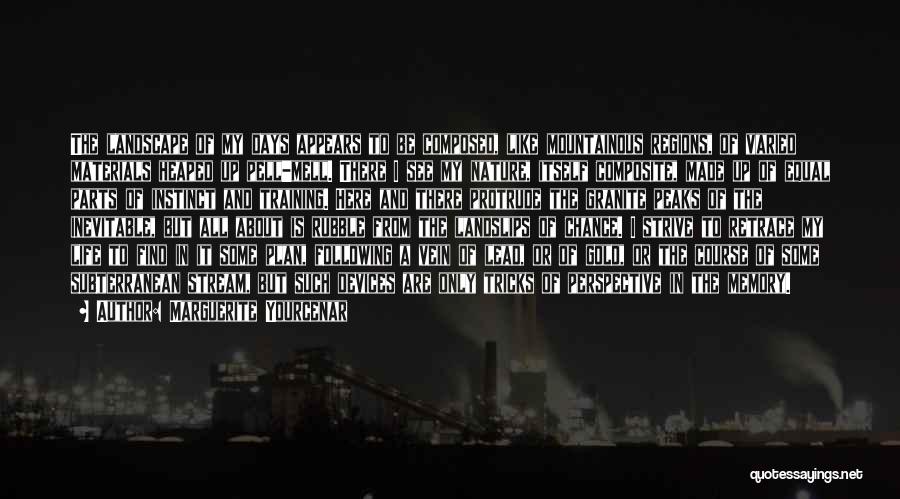
The landscape of my days appears to be composed, like mountainous regions, of varied materials heaped up pell-mell. There I see my nature, itself composite, made up of equal parts of instinct and training. Here and there protrude the granite peaks of the inevitable, but all about is rubble from the landslips of chance. I strive to retrace my life to find in it some plan, following a vein of lead, or of gold, or the course of some subterranean stream, but such devices are only tricks of perspective in the memory. — Marguerite Yourcenar
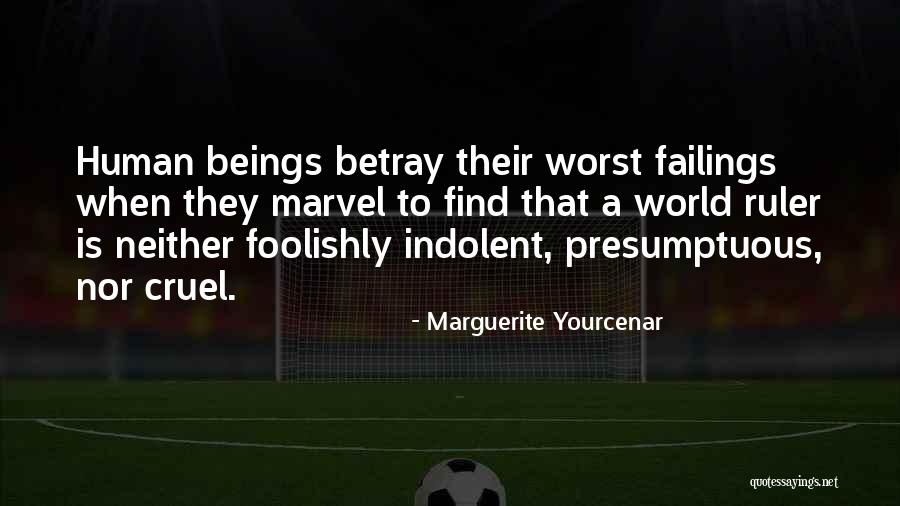
Human beings betray their worst failings when they marvel to find that a world ruler is neither foolishly indolent, presumptuous, nor cruel. — Marguerite Yourcenar

Leaving behind books is even more beautiful - there are far too many children. — Marguerite Yourcenar
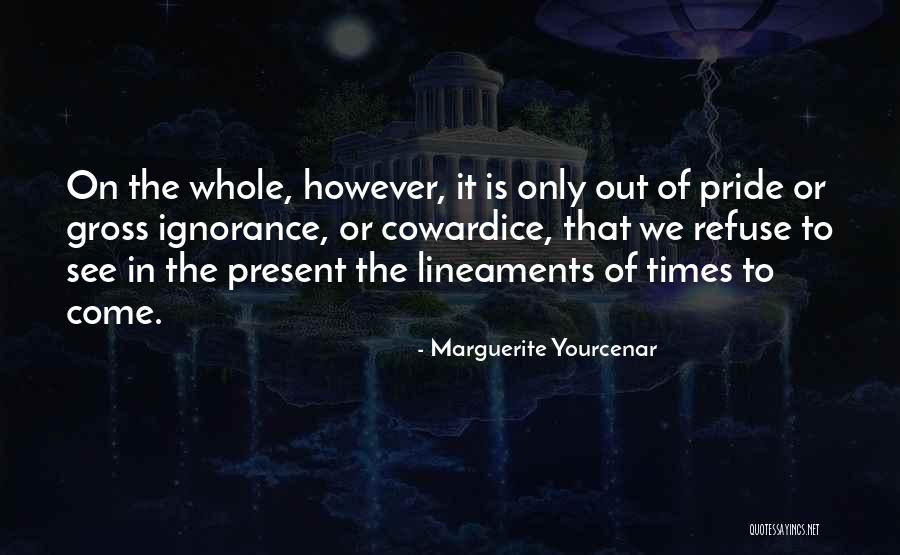
On the whole, however, it is only out of pride or gross ignorance, or cowardice, that we refuse to see in the present the lineaments of times to come. — Marguerite Yourcenar

It displeases me to have some creature think that he can foresee and profit from my desire, automatically adapting himself to what he supposes to be my taste. — Marguerite Yourcenar
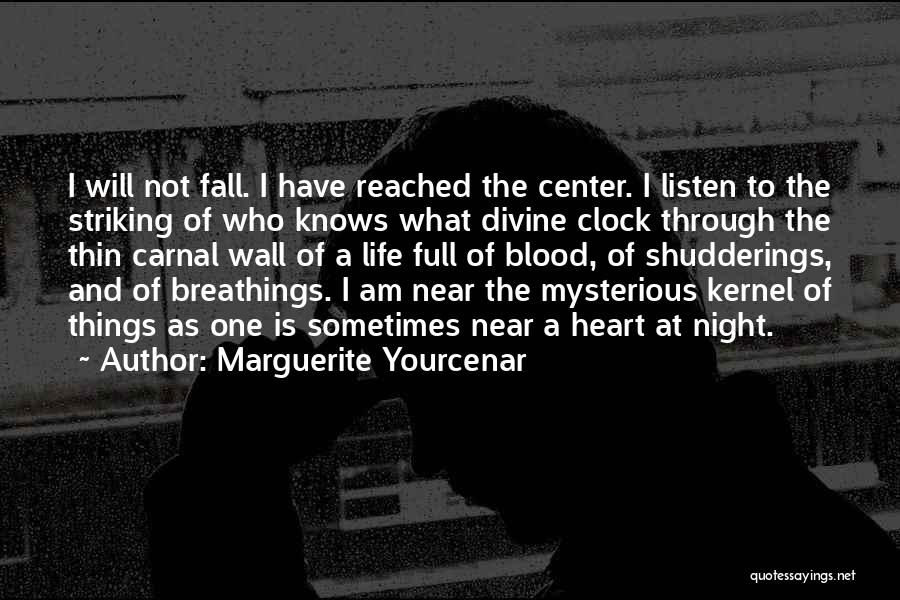
I will not fall. I have reached the center. I listen to the striking of who knows what divine clock through the thin carnal wall of a life full of blood, of shudderings, and of breathings. I am near the mysterious kernel of things as one is sometimes near a heart at night. — Marguerite Yourcenar

The world is big ... May it please the One who perchance is to expand the human heart to life's full measure. — Marguerite Yourcenar
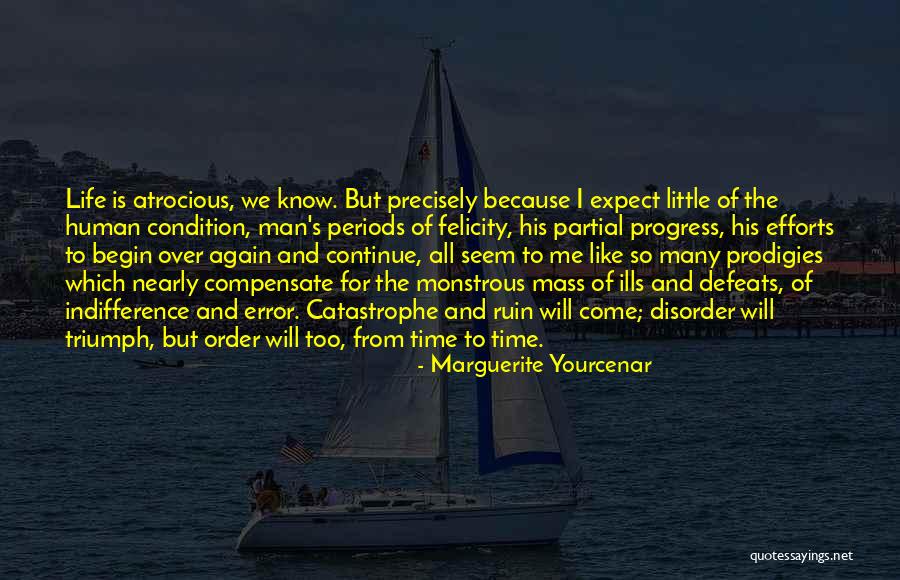
Life is atrocious, we know. But precisely because I expect little of the human condition, man's periods of felicity, his partial progress, his efforts to begin over again and continue, all seem to me like so many prodigies which nearly compensate for the monstrous mass of ills and defeats, of indifference and error. Catastrophe and ruin will come; disorder will triumph, but order will too, from time to time. — Marguerite Yourcenar

Sickness disgusts us with death, and we wish to get well, which is a way of wishing to live. But weakness and suffering, with manifold bodily woes, soon discourage the invalid from trying to regain ground: he tires of those respites which are but snares, of that faltering strength, those ardors cut short, and that perpetual lying in wait for the next attack. — Marguerite Yourcenar

I did not love less; indeed I loved more. But the weight of love, like that of an arm thrown tenderly across a chest, becomes little by little too heavy to bear. — Marguerite Yourcenar

The more I think of it, the more our ideas, our idols and our so-called holy practices, and those of our visions which supposedly are ineffable, all seem to me to be engendered merely by the stirrings of the human machine, exactly as is the wind from our nostrils or from our netherparts, and as is our sweat and salty water from tears, or the white blood passed in love, or the muddy excrement of the body. It enraged me to think that man should so waste his own substance in construction of theories that were almost always pernicious, and should speak of chastity before having examined the whole machinery of sex; that he should debate the question of free will instead of pondering the thousand obscure reasons which, for example, cause you to blink if I suddenly point a stick at your eyes; or that he should talk of Hell before having looked more closely into the question of death. — Marguerite Yourcenar
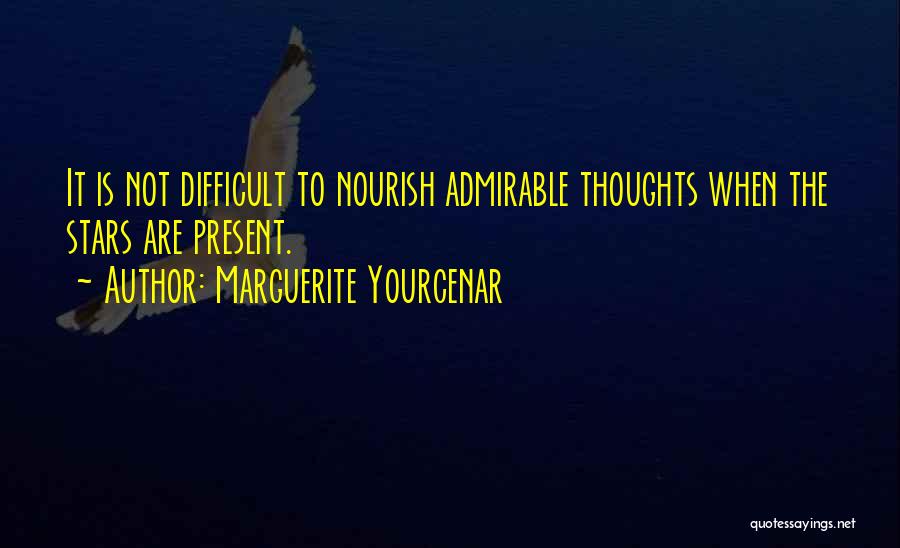
It is not difficult to nourish admirable thoughts when the stars are present. — Marguerite Yourcenar
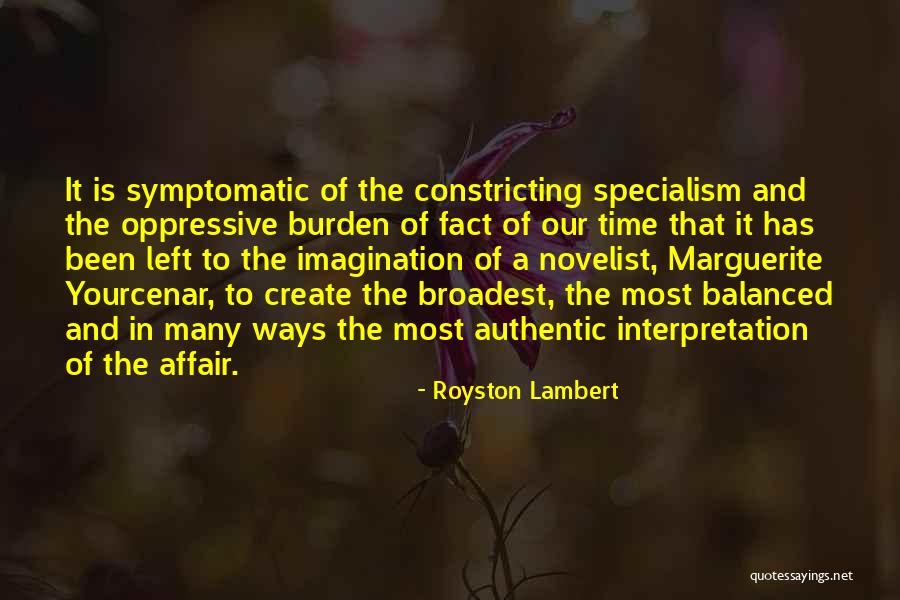
It is symptomatic of the constricting specialism and the oppressive burden of fact of our time that it has been left to the imagination of a novelist, Marguerite Yourcenar, to create the broadest, the most balanced and in many ways the most authentic interpretation of the affair. — Royston Lambert
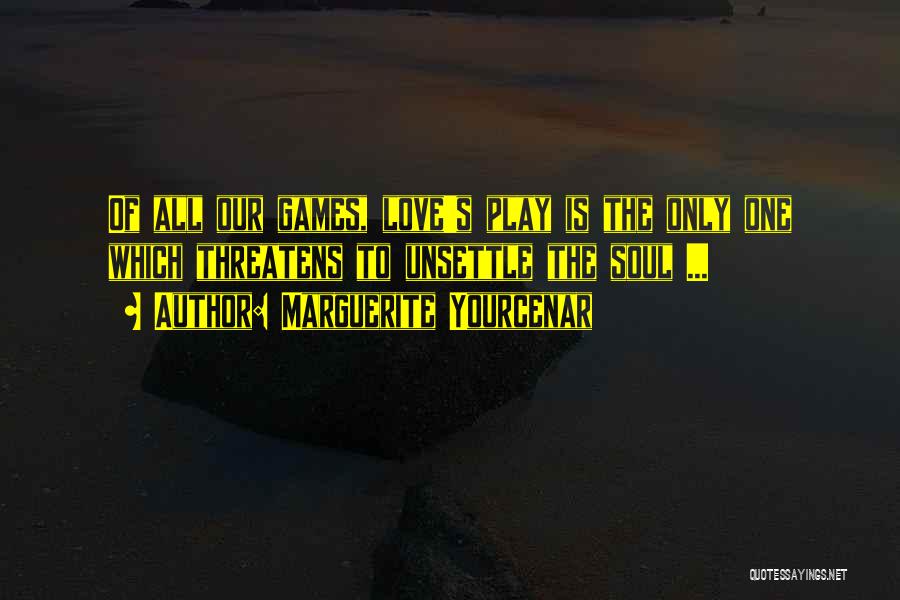
Of all our games, love's play is the only one which threatens to unsettle the soul ... — Marguerite Yourcenar

The short and obscene sentence of Poseidonius about the rubbing together of two small pieces of flesh, which I have seen you copy in your exercise books with the application of a good schoolboy, does no more to define the phenomenon of love than the cord touched by the finger accounts for the infinite miracle of sounds. Such a dictum is less an insult to pleasure than to the flesh itself, that amazing instrument of muscles, blood, and skin, that red-tinged cloud whose lightning is the soul. — Marguerite Yourcenar
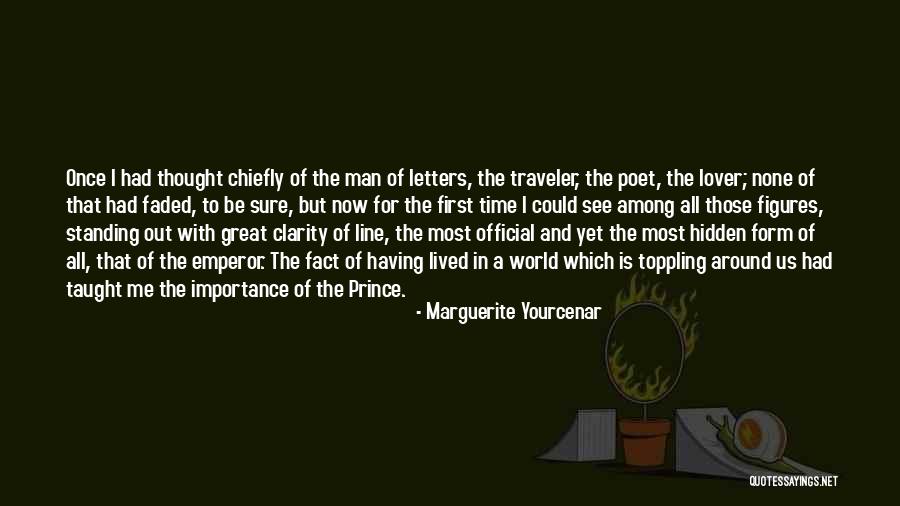
Once I had thought chiefly of the man of letters, the traveler, the poet, the lover; none of that had faded, to be sure, but now for the first time I could see among all those figures, standing out with great clarity of line, the most official and yet the most hidden form of all, that of the emperor. The fact of having lived in a world which is toppling around us had taught me the importance of the Prince. — Marguerite Yourcenar
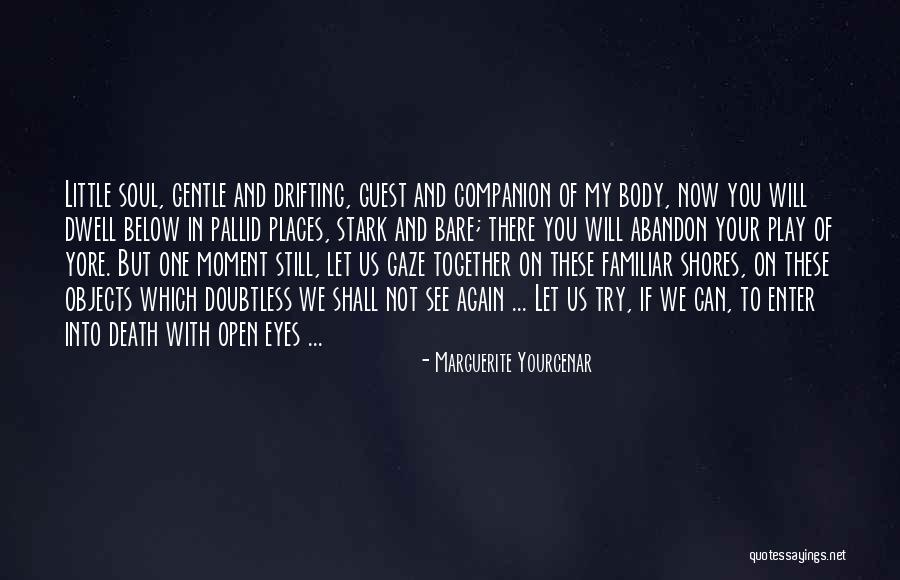
Little soul, gentle and drifting, guest and companion of my body, now you will dwell below in pallid places, stark and bare; there you will abandon your play of yore. But one moment still, let us gaze together on these familiar shores, on these objects which doubtless we shall not see again ... Let us try, if we can, to enter into death with open eyes ... — Marguerite Yourcenar
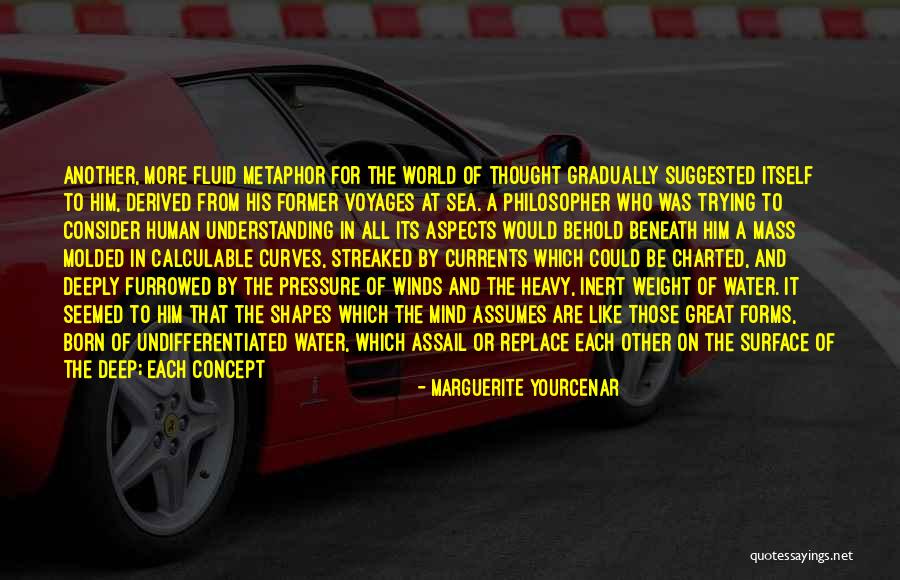
Another, more fluid metaphor for the world of thought gradually suggested itself to him, derived from his former voyages at sea. A philosopher who was trying to consider human understanding in all its aspects would behold beneath him a mass molded in calculable curves, streaked by currents which could be charted, and deeply furrowed by the pressure of winds and the heavy, inert weight of water. It seemed to him that the shapes which the mind assumes are like those great forms, born of undifferentiated water, which assail or replace each other on the surface of the deep; each concept collapses, eventually, to merge with its very opposite, like two waves breaking against each other only to subside into the same single line of white foam. — Marguerite Yourcenar

No one understands eternity. One simply recognizes its existence. — Marguerite Yourcenar
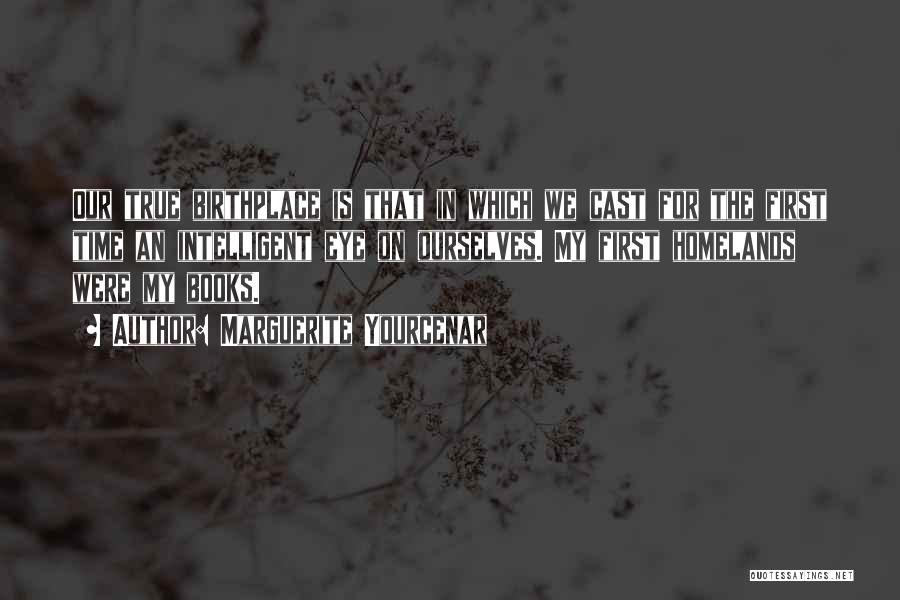
Our true birthplace is that in which we cast for the first time an intelligent eye on ourselves. My first homelands were my books. — Marguerite Yourcenar
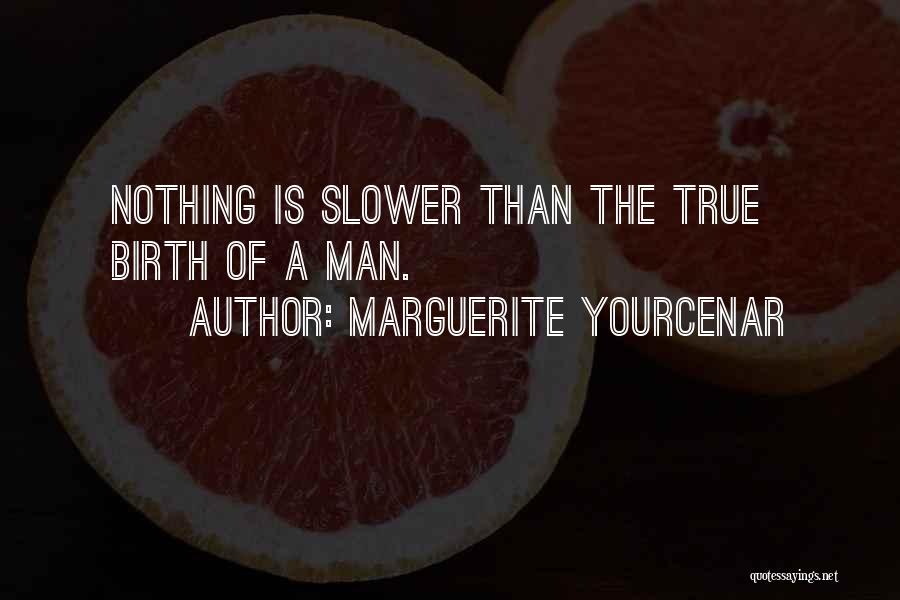
Nothing is slower than the true birth of a man. — Marguerite Yourcenar
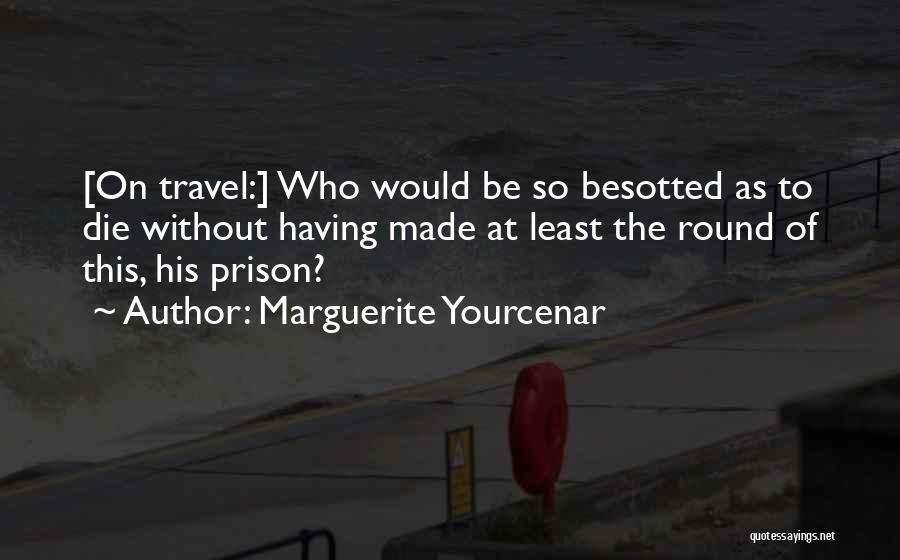
[On travel:] Who would be so besotted as to die without having made at least the round of this, his prison? — Marguerite Yourcenar
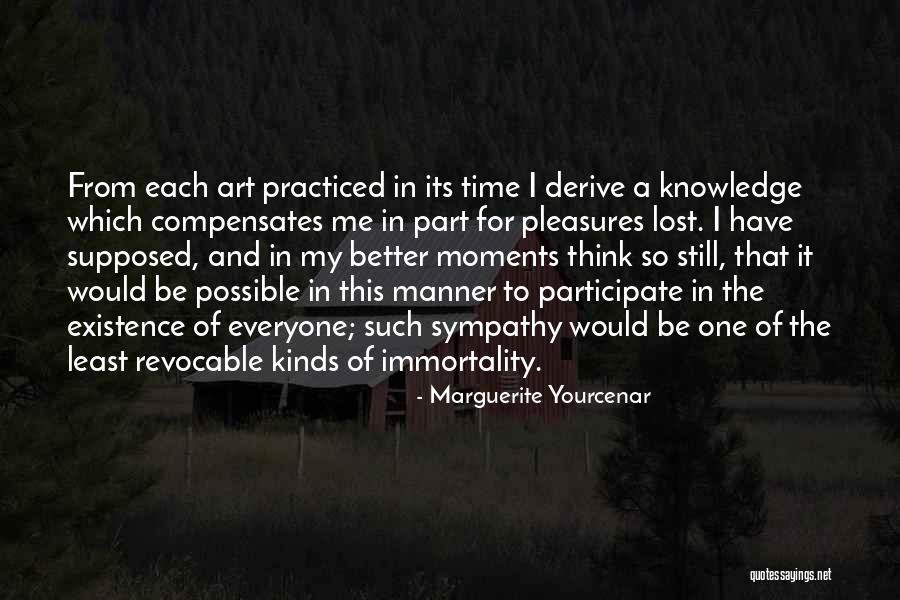
From each art practiced in its time I derive a knowledge which compensates me in part for pleasures lost. I have supposed, and in my better moments think so still, that it would be possible in this manner to participate in the existence of everyone; such sympathy would be one of the least revocable kinds of immortality. — Marguerite Yourcenar
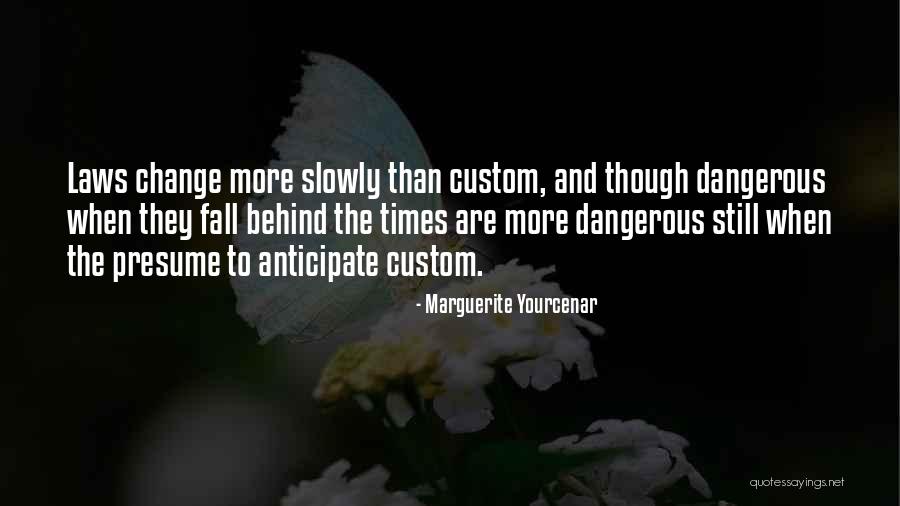
Laws change more slowly than custom, and though dangerous when they fall behind the times are more dangerous still when the presume to anticipate custom. — Marguerite Yourcenar
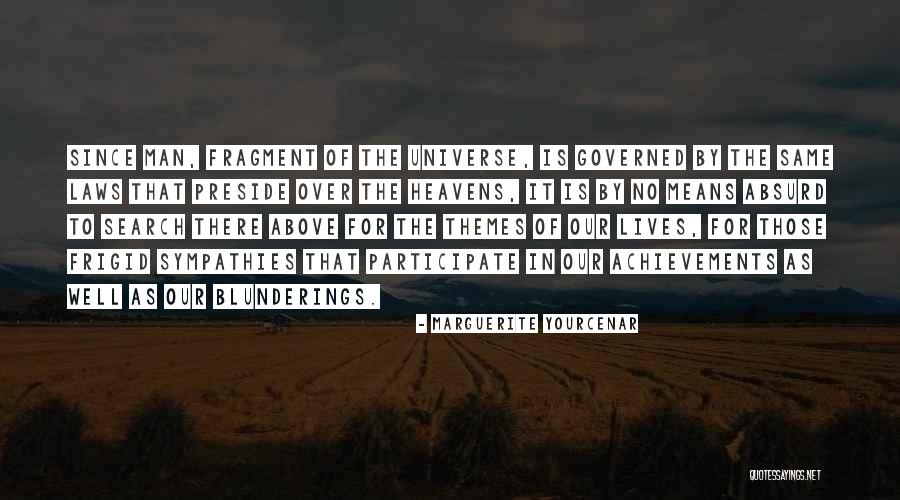
Since man, fragment of the universe, is governed by the same laws that preside over the heavens, it is by no means absurd to search there above for the themes of our lives, for those frigid sympathies that participate in our achievements as well as our blunderings. — Marguerite Yourcenar
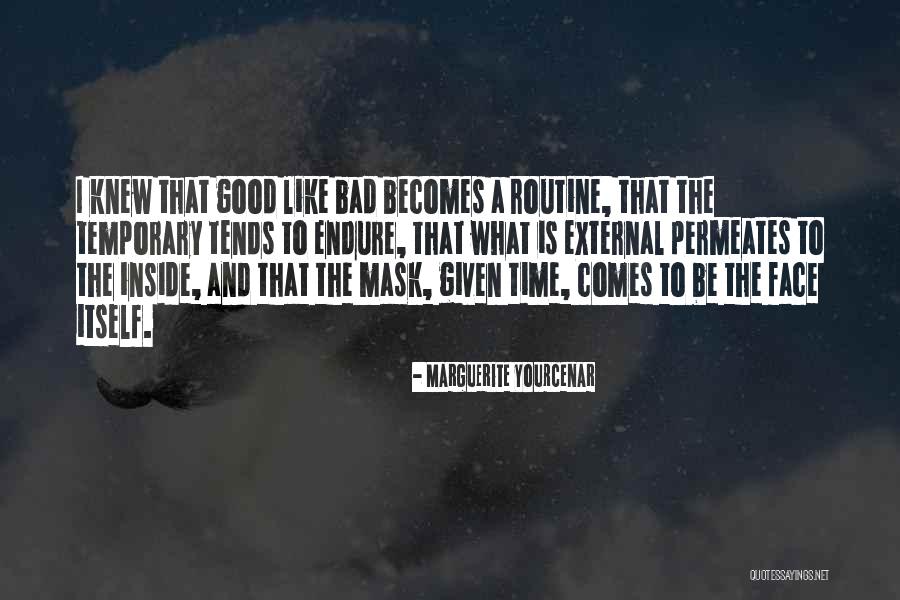
I knew that good like bad becomes a routine, that the temporary tends to endure, that what is external permeates to the inside, and that the mask, given time, comes to be the face itself. — Marguerite Yourcenar
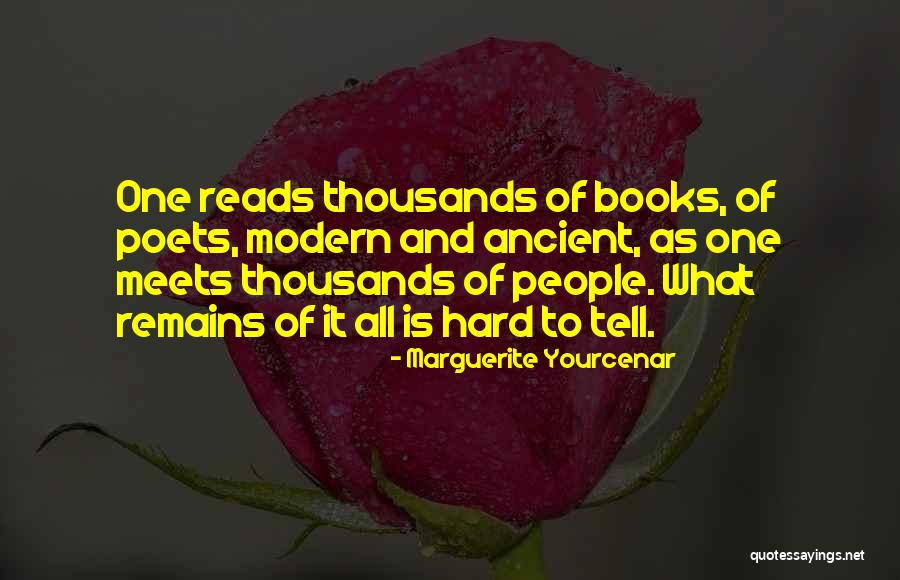
One reads thousands of books, of poets, modern and ancient, as one meets thousands of people. What remains of it all is hard to tell. — Marguerite Yourcenar

I lent only half an ear to those well-intentioned folk who say that happiness is enervating, liberty too relaxing, and that kindness is a corruption for those upon whom it is practiced. That may be; but in the world as it is, such reasoning amounts to a refusal to nourish a starving man decently, for fear that in a few years he may suffer from overfeeding. When useless servitude has been alleviated as far as possible, and unnecessary misfortune avoided, there will remain as a test of man's fortitude that long series of veritable ills, death, old age, and incurable sickness, love unrequited and friendship rejected or betrayed, the mediocrity of a life less vast than our projects and duller than our dreams; in short, all the woes caused by the divine nature of things. — Marguerite Yourcenar
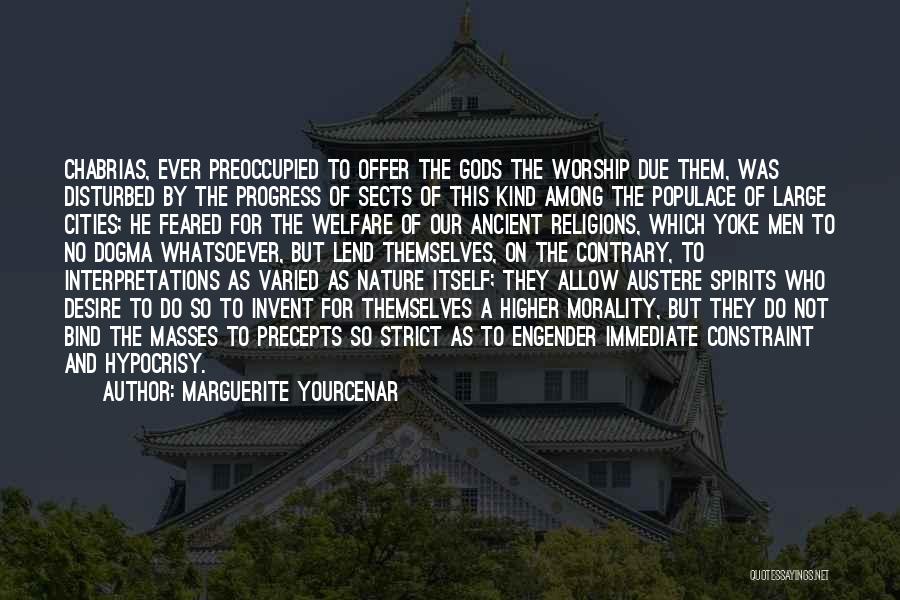
Chabrias, ever preoccupied to offer the gods the worship due them, was disturbed by the progress of sects of this kind among the populace of large cities; he feared for the welfare of our ancient religions, which yoke men to no dogma whatsoever, but lend themselves, on the contrary, to interpretations as varied as nature itself; they allow austere spirits who desire to do so to invent for themselves a higher morality, but they do not bind the masses to precepts so strict as to engender immediate constraint and hypocrisy. — Marguerite Yourcenar
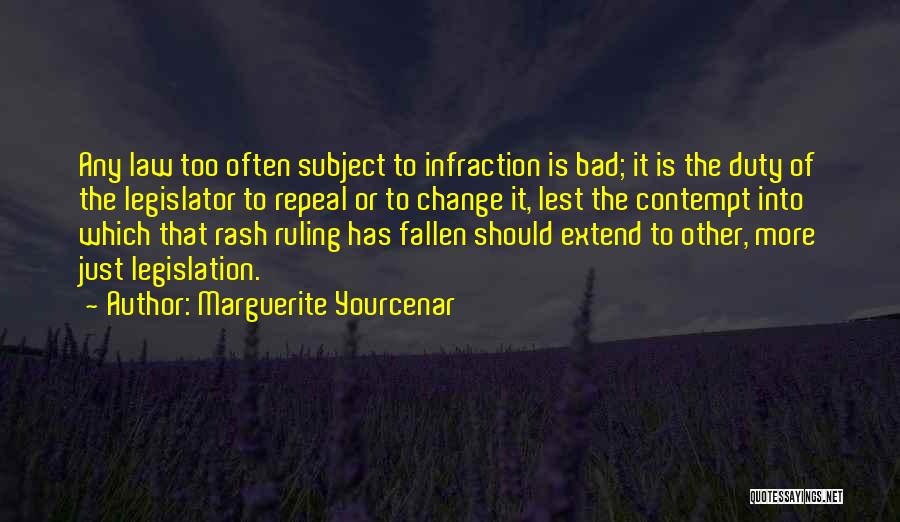
Any law too often subject to infraction is bad; it is the duty of the legislator to repeal or to change it, lest the contempt into which that rash ruling has fallen should extend to other, more just legislation. — Marguerite Yourcenar
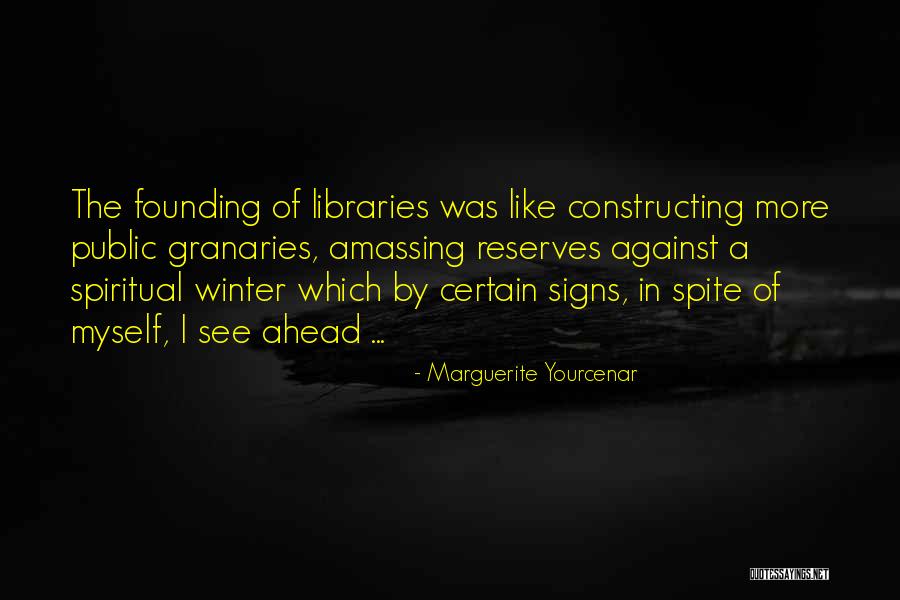
The founding of libraries was like constructing more public granaries, amassing reserves against a spiritual winter which by certain signs, in spite of myself, I see ahead ... — Marguerite Yourcenar
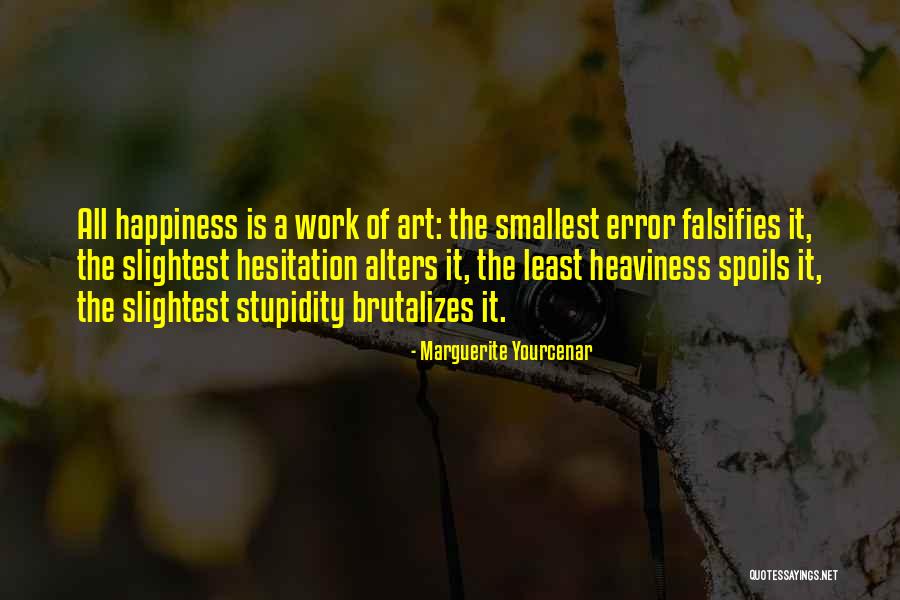
All happiness is a work of art: the smallest error falsifies it, the slightest hesitation alters it, the least heaviness spoils it, the slightest stupidity brutalizes it. — Marguerite Yourcenar

A touch of madness is, I think, almost always necessary for constructing a destiny. — Marguerite Yourcenar
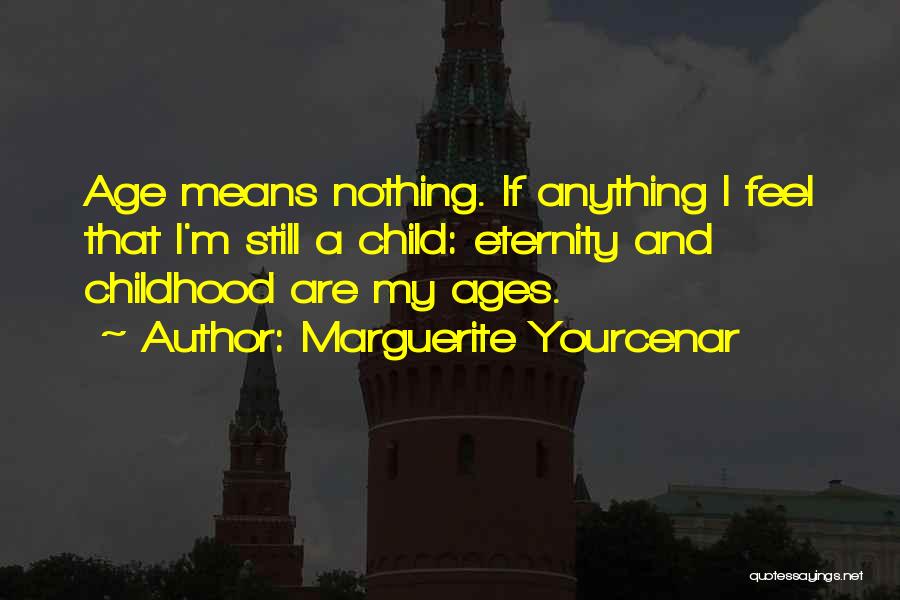
Age means nothing. If anything I feel that I'm still a child: eternity and childhood are my ages. — Marguerite Yourcenar
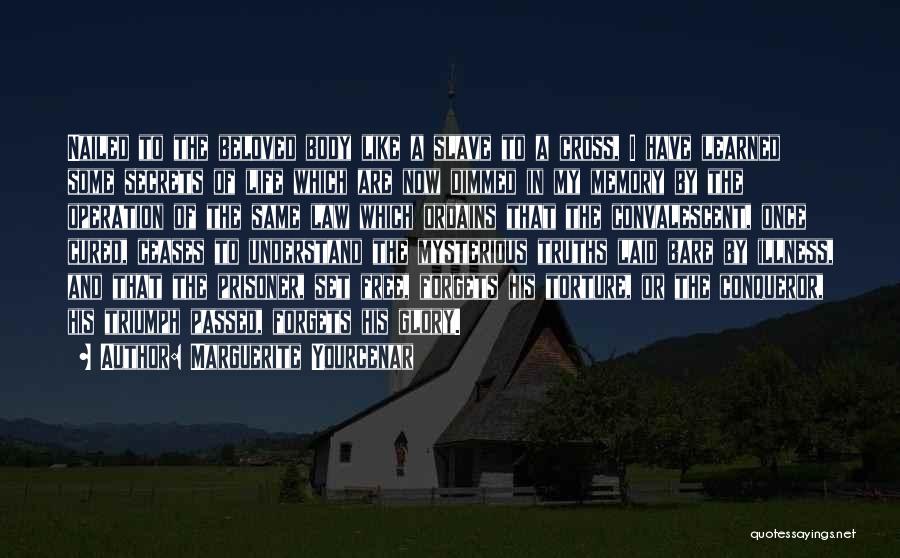
Nailed to the beloved body like a slave to a cross, I have learned some secrets of life which are now dimmed in my memory by the operation of the same law which ordains that the convalescent, once cured, ceases to understand the mysterious truths laid bare by illness, and that the prisoner, set free, forgets his torture, or the conqueror, his triumph passed, forgets his glory. — Marguerite Yourcenar

In the evenings the art of building gave way to that of music, which is architecture, too, though invisible. — Marguerite Yourcenar

And nevertheless I have loved certain of my masters, and those strangely intimate though elusive relations existing between student and teacher, and the Sirens singing somewhere within the cracked voice of him who is first to reveal a new idea. The greatest seducer was not Alcibiades, afterall, it was Socrates. — Marguerite Yourcenar
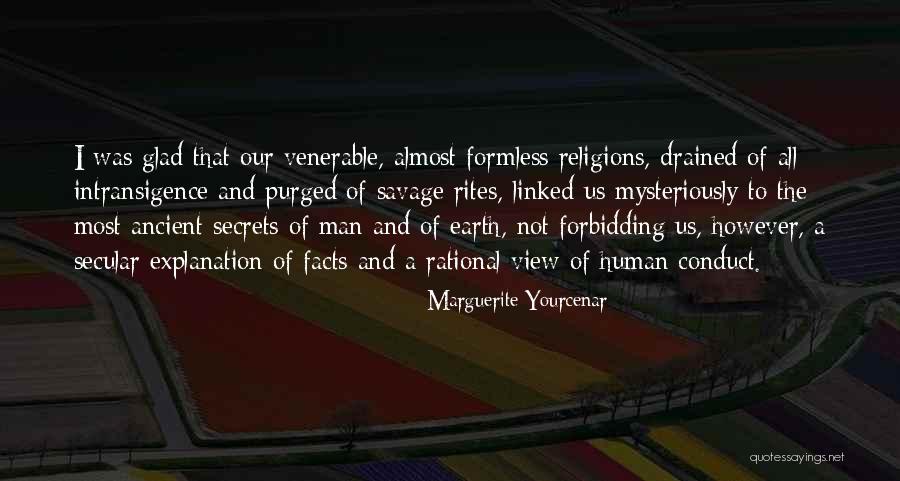
I was glad that our venerable, almost formless religions, drained of all intransigence and purged of savage rites, linked us mysteriously to the most ancient secrets of man and of earth, not forbidding us, however, a secular explanation of facts and a rational view of human conduct. — Marguerite Yourcenar
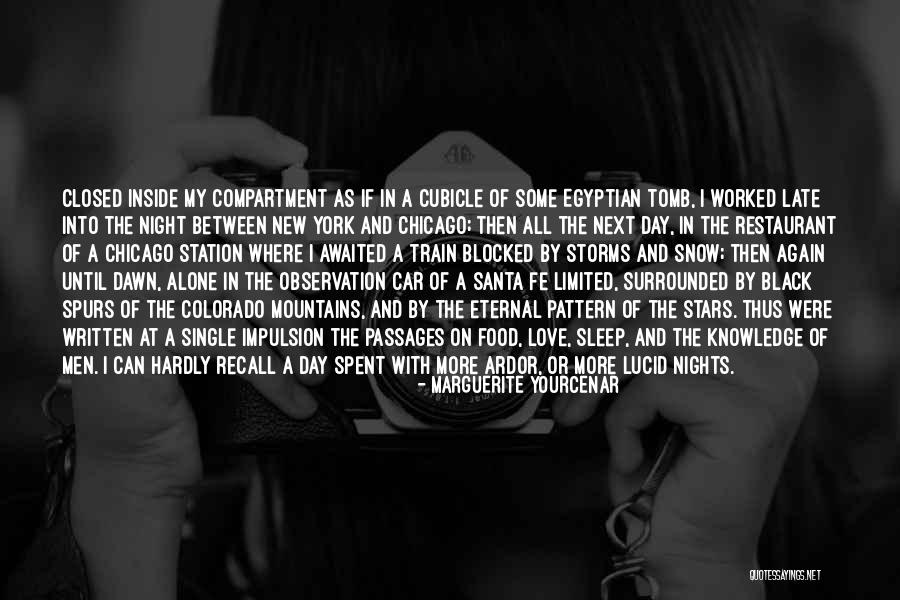
Closed inside my compartment as if in a cubicle of some Egyptian tomb, I worked late into the night between New York and Chicago; then all the next day, in the restaurant of a Chicago station where I awaited a train blocked by storms and snow; then again until dawn, alone in the observation car of a Santa Fe limited, surrounded by black spurs of the Colorado mountains, and by the eternal pattern of the stars. Thus were written at a single impulsion the passages on food, love, sleep, and the knowledge of men. I can hardly recall a day spent with more ardor, or more lucid nights. — Marguerite Yourcenar
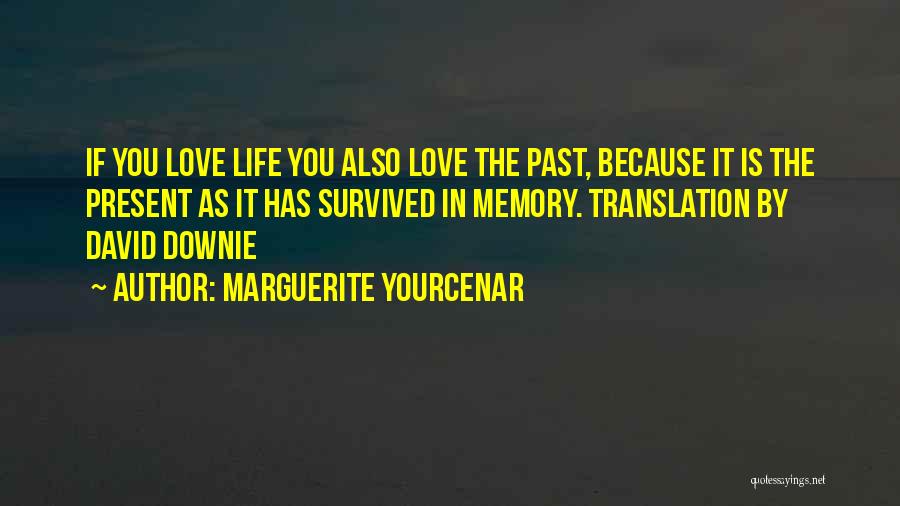
If you love life you also love the past, because it is the present as it has survived in memory. Translation by David Downie — Marguerite Yourcenar

I am not sure that the discovery of love is necessarily more exquisite than the discovery of poetry. — Marguerite Yourcenar
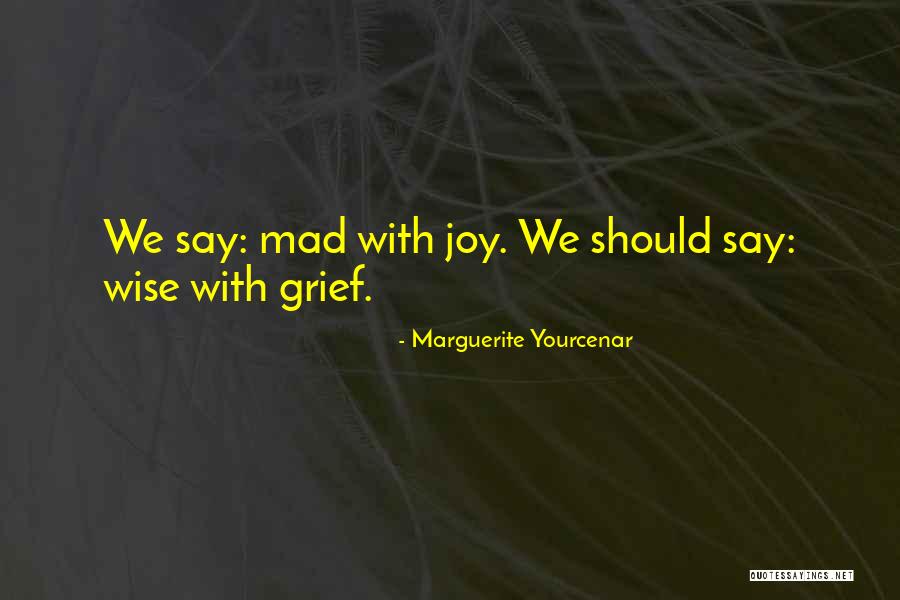
We say: mad with joy. We should say: wise with grief. — Marguerite Yourcenar
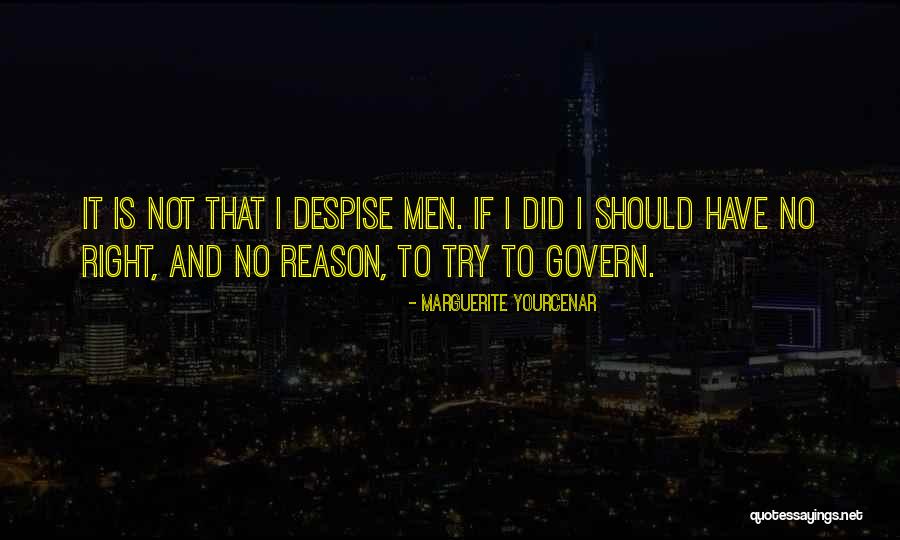
It is not that I despise men. If I did I should have no right, and no reason, to try to govern. — Marguerite Yourcenar
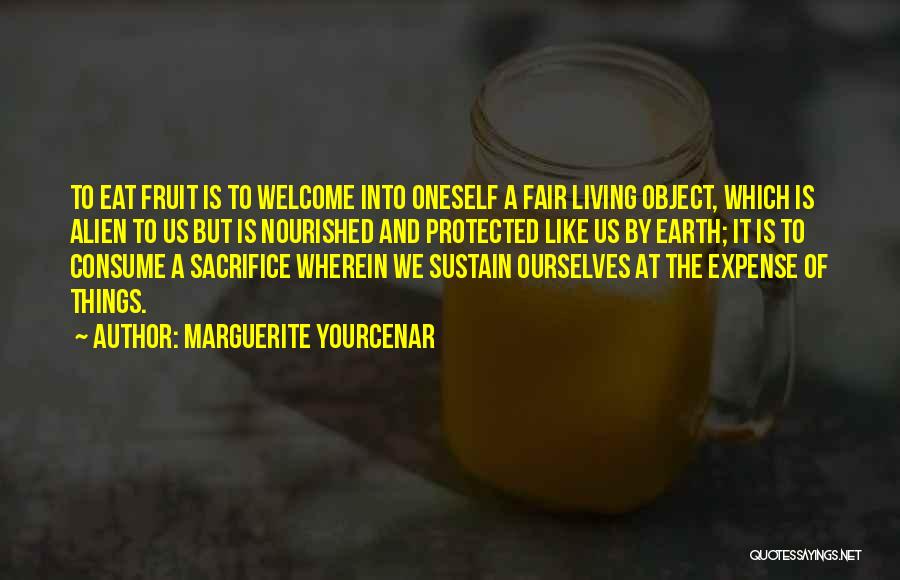
To eat fruit is to welcome into oneself a fair living object, which is alien to us but is nourished and protected like us by earth; it is to consume a sacrifice wherein we sustain ourselves at the expense of things. — Marguerite Yourcenar

Men who care passionately for women attach themselves at least as much to the temple and to the accessories of the cult as to their goddess herself. — Marguerite Yourcenar

That imperial guard which poets and humanists mount in relay around any great memory. — Marguerite Yourcenar
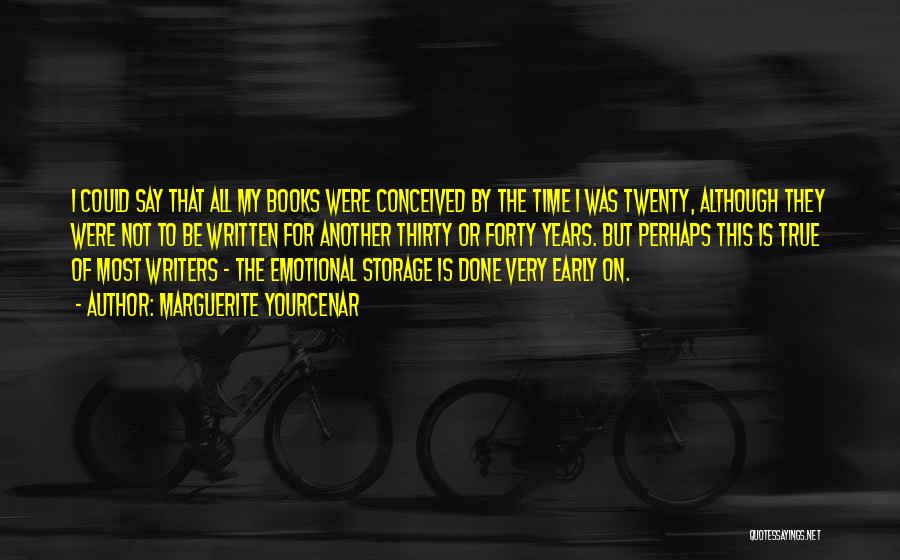
I could say that all my books were conceived by the time I was twenty, although they were not to be written for another thirty or forty years. But perhaps this is true of most writers - the emotional storage is done very early on. — Marguerite Yourcenar
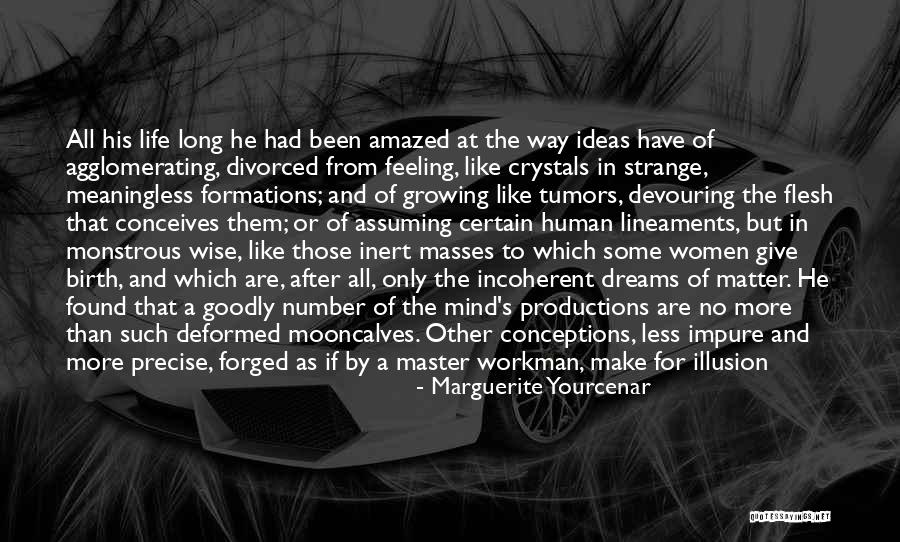
All his life long he had been amazed at the way ideas have of agglomerating, divorced from feeling, like crystals in strange, meaningless formations; and of growing like tumors, devouring the flesh that conceives them; or of assuming certain human lineaments, but in monstrous wise, like those inert masses to which some women give birth, and which are, after all, only the incoherent dreams of matter. He found that a goodly number of the mind's productions are no more than such deformed mooncalves. Other conceptions, less impure and more precise, forged as if by a master workman, make for illusion when viewed from afar; though commanding our admiration for their parallels and their angles, like intricate iron grills, they are nevertheless only bars behind which the understanding imprisons itself, abstract fetters already eaten into by the rust of false premises. — Marguerite Yourcenar

Morals are a matter of private agreement; decency is of public concern. — Marguerite Yourcenar
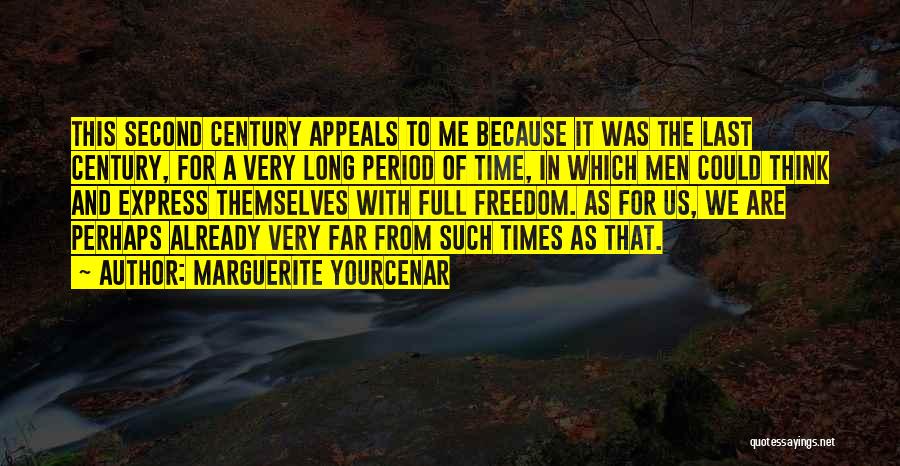
This Second Century appeals to me because it was the last century, for a very long period of time, in which men could think and express themselves with full freedom. As for us, we are perhaps already very far from such times as that. — Marguerite Yourcenar

The true birthplace is that wherein for the first time one looks intelligently upon oneself; my first homelands have been books, and to a lesser degree schools. — Marguerite Yourcenar

Every hour has its immediate duty, its special injunction which dominates all others ... — Marguerite Yourcenar

In alchemical treatises, the formula L'Oeuvre au Noir ... designates what is said to be the most difficult phase of the alchemist's process, the separation and dissolution of substance. It is still not clear whether the term applied to daring experiments on matter itself, or whether it was understood to symbolize trials of the mind in discarding all forms of routine and prejudice. Doubtless it signified one or the other meaning alternately, or perhaps both at the same time. — Marguerite Yourcenar
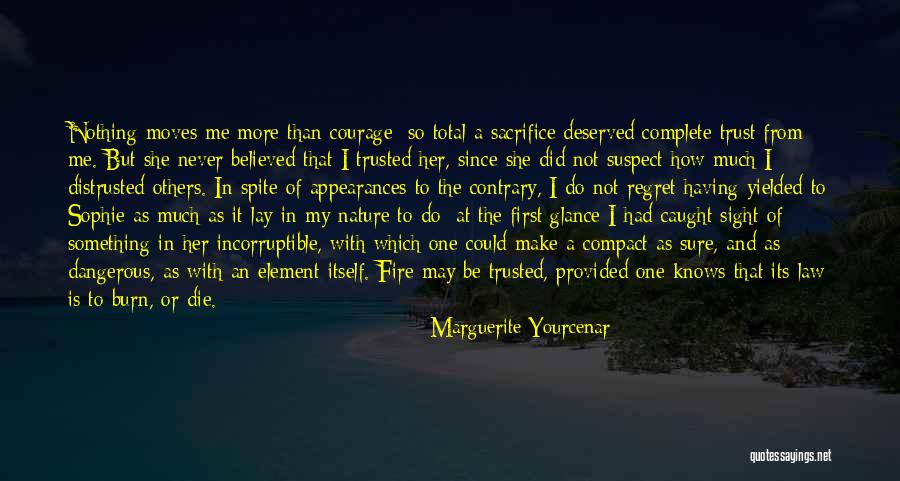
Nothing moves me more than courage: so total a sacrifice deserved complete trust from me. But she never believed that I trusted her, since she did not suspect how much I distrusted others. In spite of appearances to the contrary, I do not regret having yielded to Sophie as much as it lay in my nature to do; at the first glance I had caught sight of something in her incorruptible, with which one could make a compact as sure, and as dangerous, as with an element itself. Fire may be trusted, provided one knows that its law is to burn, or die. — Marguerite Yourcenar

Translating is writing. — Marguerite Yourcenar
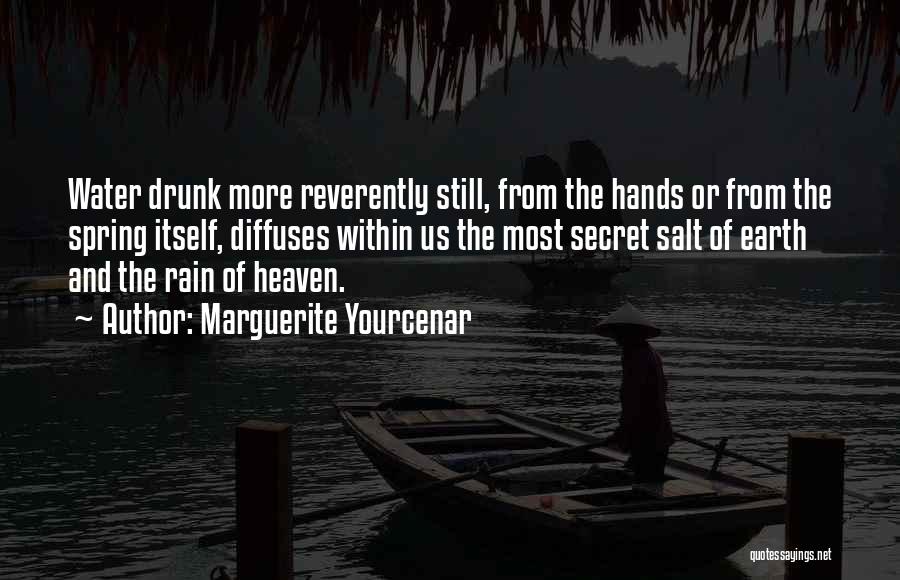
Water drunk more reverently still, from the hands or from the spring itself, diffuses within us the most secret salt of earth and the rain of heaven. — Marguerite Yourcenar
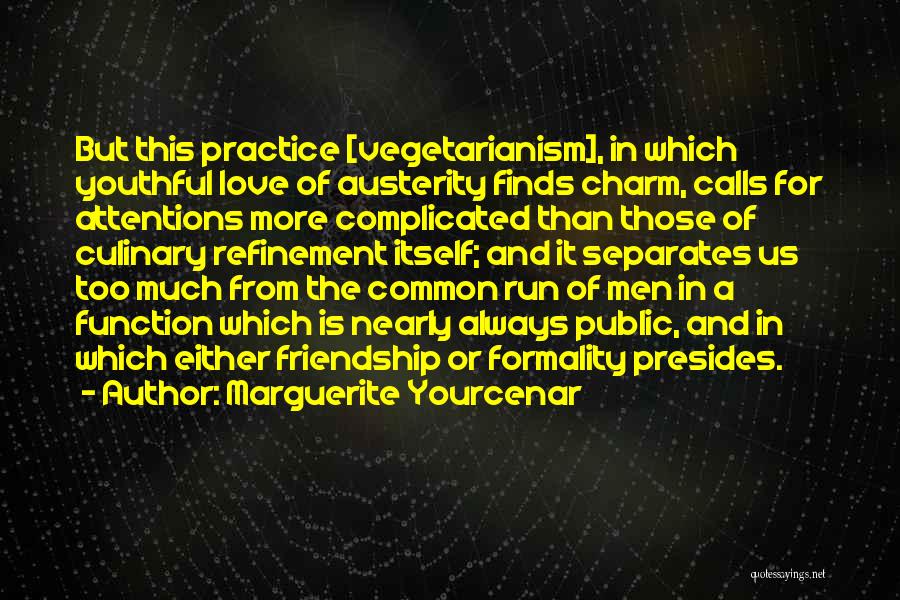
But this practice [vegetarianism], in which youthful love of austerity finds charm, calls for attentions more complicated than those of culinary refinement itself; and it separates us too much from the common run of men in a function which is nearly always public, and in which either friendship or formality presides. — Marguerite Yourcenar

For me, a poet is someone who is 'in contact.' Someone through whom a current is passing. — Marguerite Yourcenar
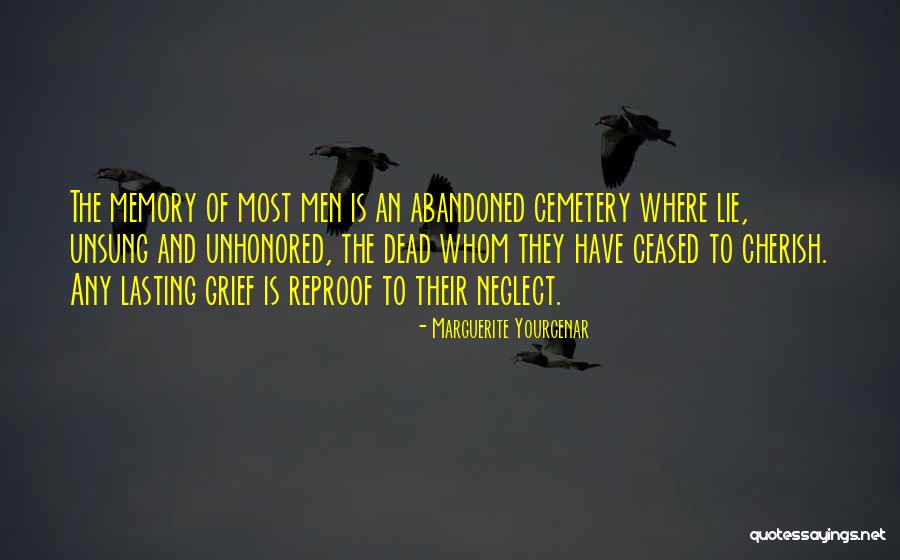
The memory of most men is an abandoned cemetery where lie, unsung and unhonored, the dead whom they have ceased to cherish. Any lasting grief is reproof to their neglect. — Marguerite Yourcenar

Writing is a perpetual choice between a thousand expressions, none of which satisfies me, none of which, above all, satisfies me without the others. Yet I ought to know that only music permits a succession of chords. — Marguerite Yourcenar

I was willing to yield to nostalgia, that melancholy residue of desire. — Marguerite Yourcenar

A being afire with life cannot foresee death; in fact, by each of his deeds he denies that death exists. — Marguerite Yourcenar
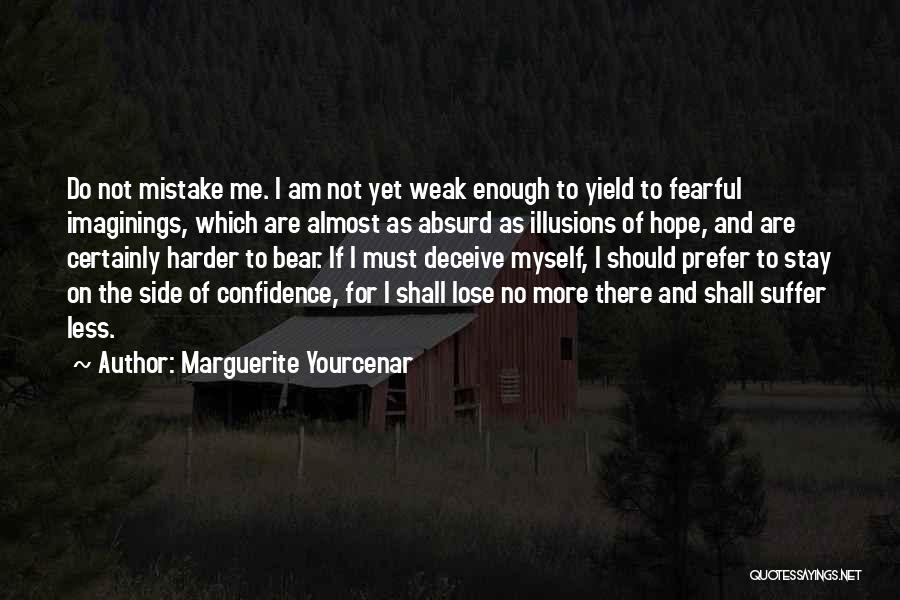
Do not mistake me. I am not yet weak enough to yield to fearful imaginings, which are almost as absurd as illusions of hope, and are certainly harder to bear. If I must deceive myself, I should prefer to stay on the side of confidence, for I shall lose no more there and shall suffer less. — Marguerite Yourcenar
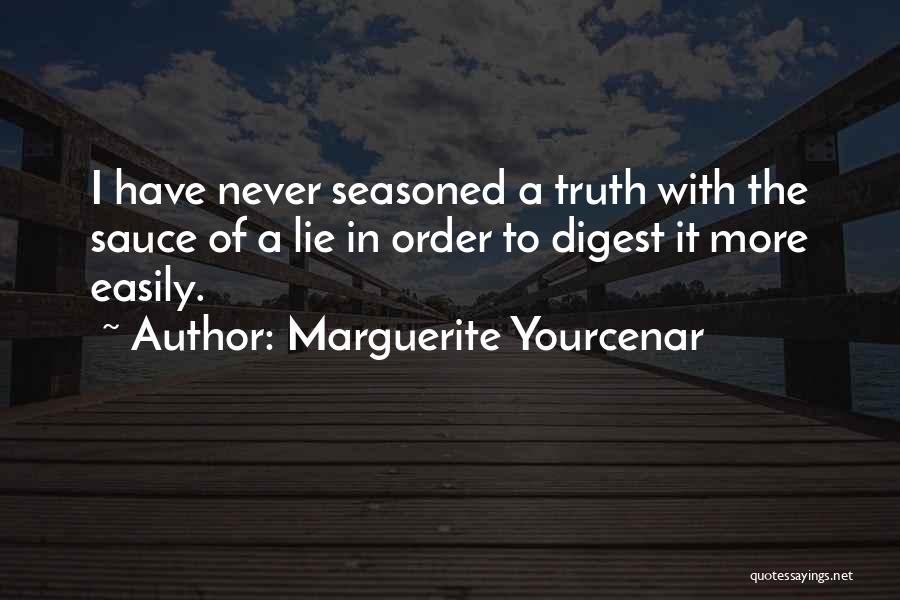
I have never seasoned a truth with the sauce of a lie in order to digest it more easily. — Marguerite Yourcenar
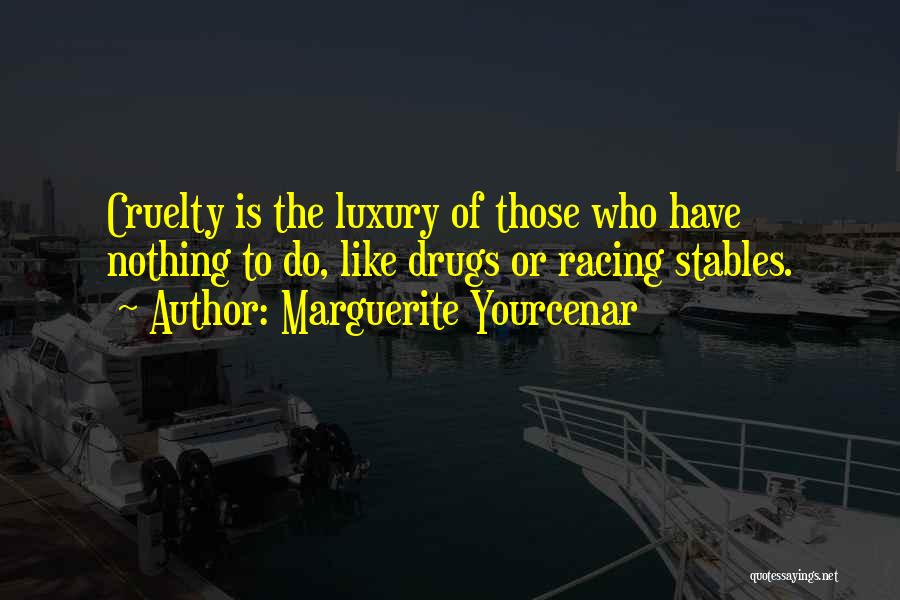
Cruelty is the luxury of those who have nothing to do, like drugs or racing stables. — Marguerite Yourcenar
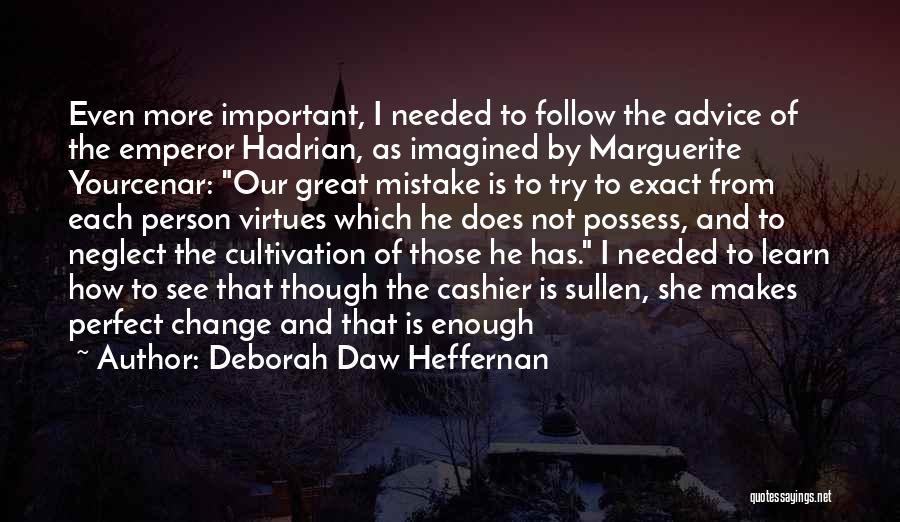
Even more important, I needed to follow the advice of the emperor Hadrian, as imagined by Marguerite Yourcenar: "Our great mistake is to try to exact from each person virtues which he does not possess, and to neglect the cultivation of those he has." I needed to learn how to see that though the cashier is sullen, she makes perfect change and that is enough — Deborah Daw Heffernan
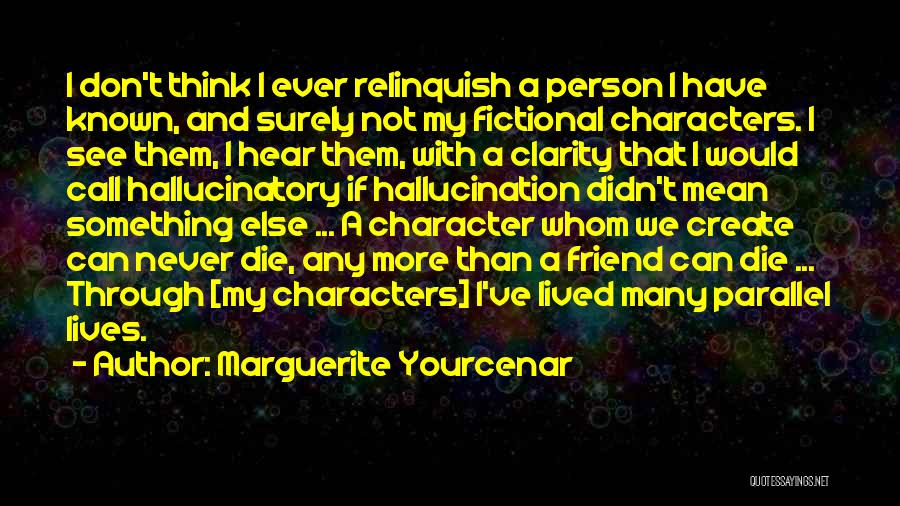
I don't think I ever relinquish a person I have known, and surely not my fictional characters. I see them, I hear them, with a clarity that I would call hallucinatory if hallucination didn't mean something else ... A character whom we create can never die, any more than a friend can die ... Through [my characters] I've lived many parallel lives. — Marguerite Yourcenar
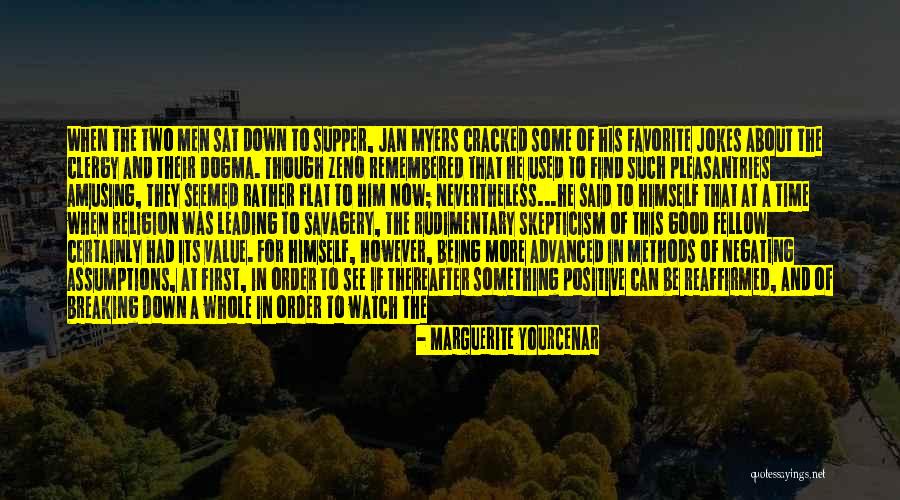
When the two men sat down to supper, Jan Myers cracked some of his favorite jokes about the clergy and their dogma. Though Zeno remembered that he used to find such pleasantries amusing, they seemed rather flat to him now; nevertheless...he said to himself that at a time when religion was leading to savagery, the rudimentary skepticism of this good fellow certainly had its value. For himself, however, being more advanced in methods of negating assumptions, at first, in order to see if thereafter something positive can be reaffirmed, and of breaking down a whole in order to watch the parts recompose themselves on another plane or in some other fashion, he no longer felt able to laugh at those easy jests. — Marguerite Yourcenar
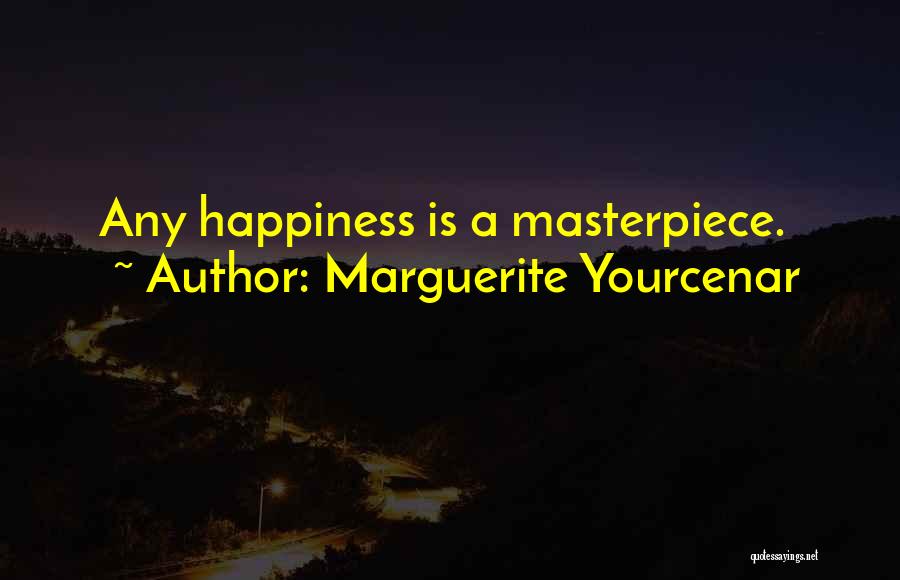
Any happiness is a masterpiece. — Marguerite Yourcenar

Want of passion is, I think, a very striking characteristic of Americans, not unrelated to their predilection for violence. For very few people truly have a passionate desire to achieve, and violence serves as a kind of substitute. — Marguerite Yourcenar
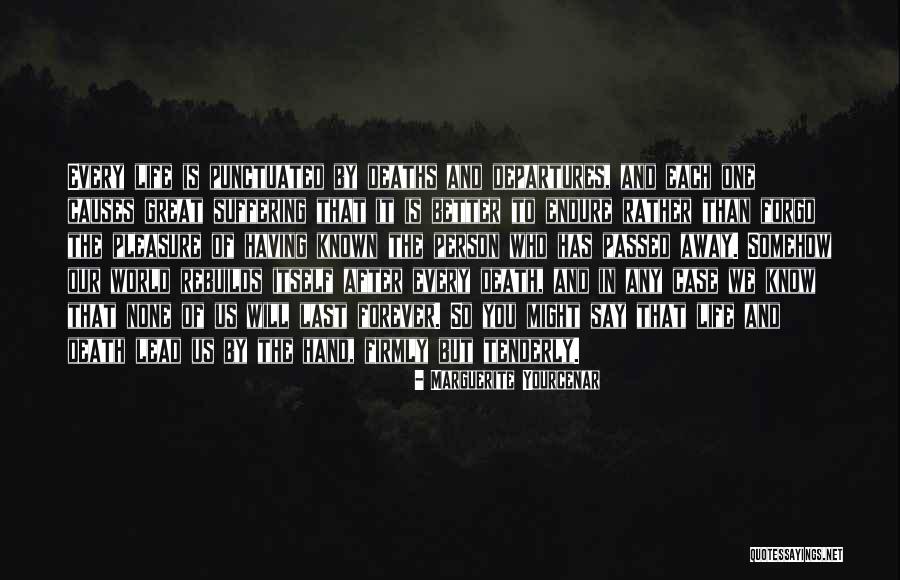
Every life is punctuated by deaths and departures, and each one causes great suffering that it is better to endure rather than forgo the pleasure of having known the person who has passed away. Somehow our world rebuilds itself after every death, and in any case we know that none of us will last forever. So you might say that life and death lead us by the hand, firmly but tenderly. — Marguerite Yourcenar
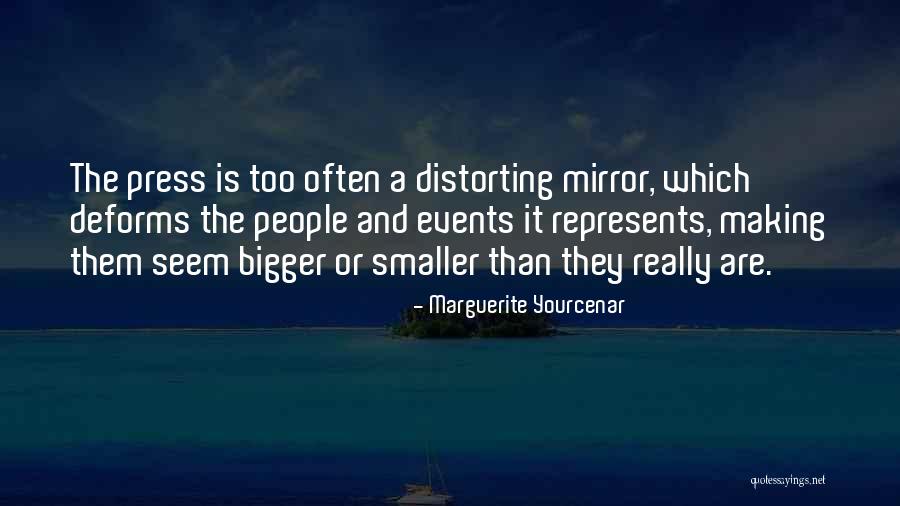
The press is too often a distorting mirror, which deforms the people and events it represents, making them seem bigger or smaller than they really are. — Marguerite Yourcenar
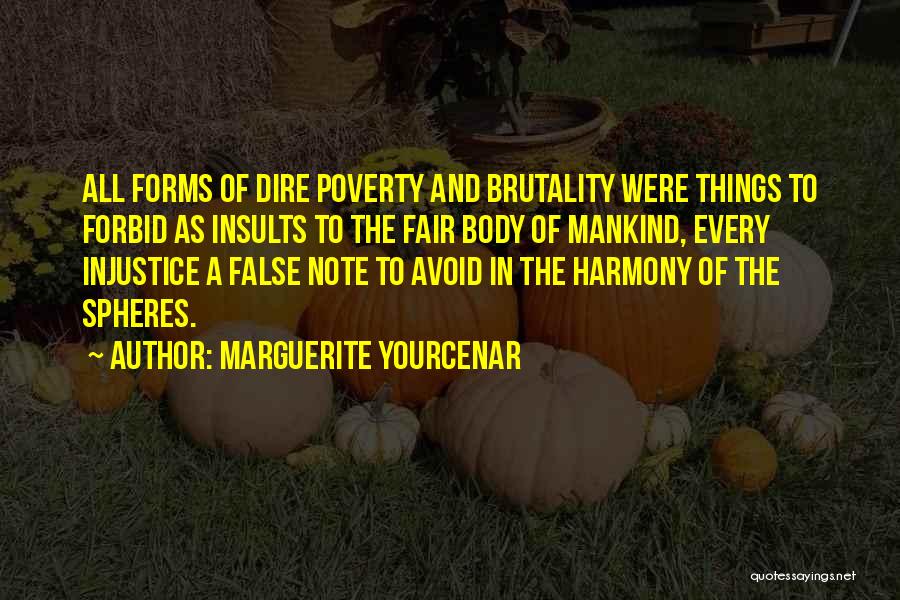
All forms of dire poverty and brutality were things to forbid as insults to the fair body of mankind, every injustice a false note to avoid in the harmony of the spheres. — Marguerite Yourcenar

He had reached that moment in life, different for each one of us, when a man abandonds himself to his demon or to his genius, following a mysterious law which bids him either to destroy or outdo himself. — Marguerite Yourcenar

Any truth creates a scandal. — Marguerite Yourcenar
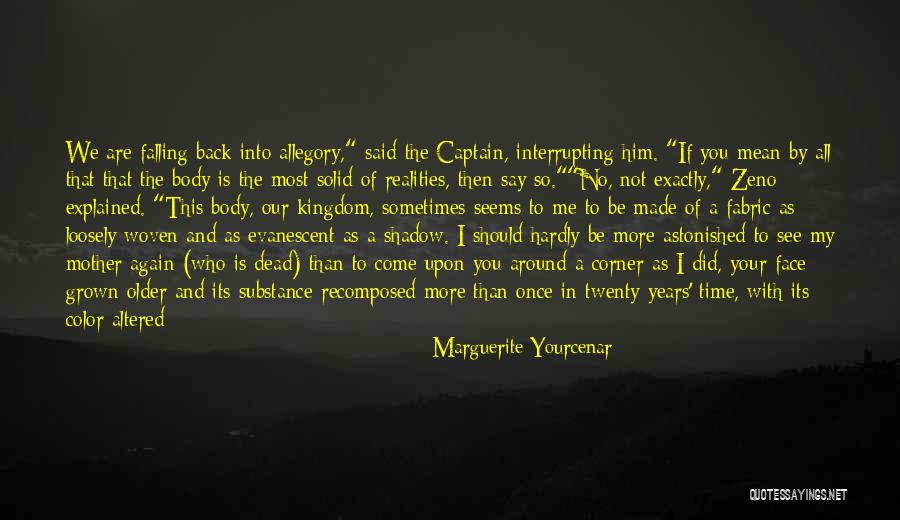
We are falling back into allegory," said the Captain, interrupting him. "If you mean by all that that the body is the most solid of realities, then say so."
"No, not exactly," Zeno explained. "This body, our kingdom, sometimes seems to me to be made of a fabric as loosely woven and as evanescent as a shadow. I should hardly be more astonished to see my mother again (who is dead) than to come upon you around a corner as I did, your face grown older and its substance recomposed more than once in twenty years' time, with its color altered by the seasons and its form somewhat changed, but your mouth still knowing my name. Think of the grain that has grown and the creatures that have lived and died in order to sustain that Henry who is and is not the one I knew twenty years ago. — Marguerite Yourcenar

And it was at about this time that I began to feel myself divine. — Marguerite Yourcenar
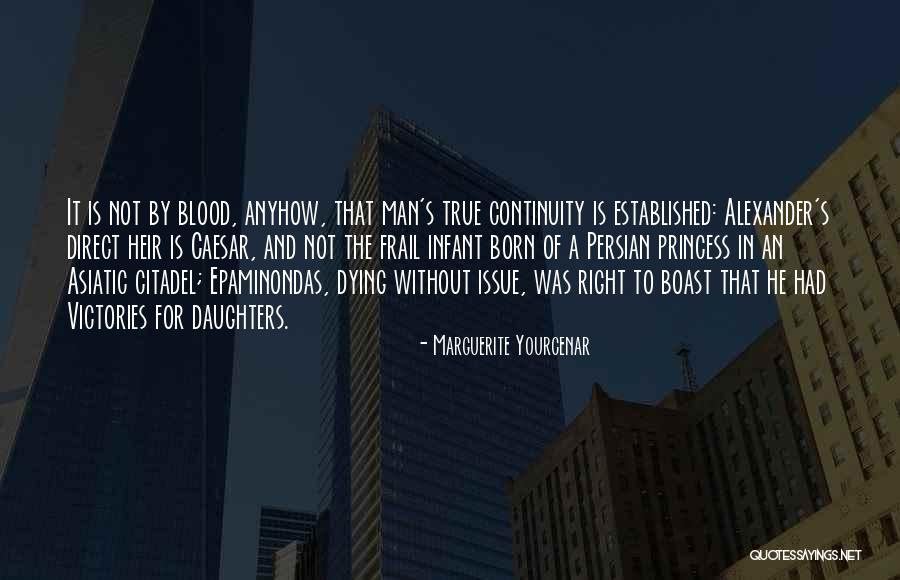
It is not by blood, anyhow, that man's true continuity is established: Alexander's direct heir is Caesar, and not the frail infant born of a Persian princess in an Asiatic citadel; Epaminondas, dying without issue, was right to boast that he had Victories for daughters. — Marguerite Yourcenar
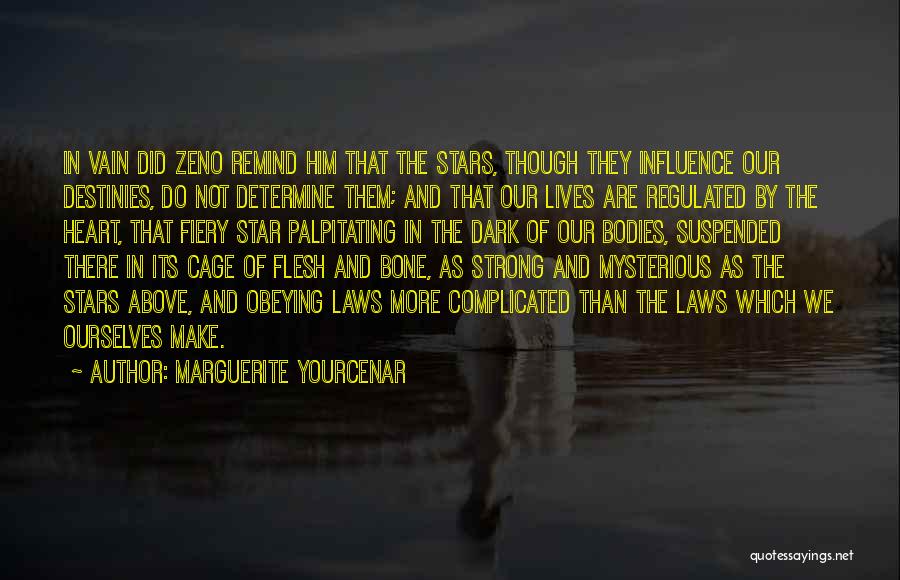
In vain did Zeno remind him that the stars, though they influence our destinies, do not determine them; and that our lives are regulated by the heart, that fiery star palpitating in the dark of our bodies, suspended there in its cage of flesh and bone, as strong and mysterious as the stars above, and obeying laws more complicated than the laws which we ourselves make. — Marguerite Yourcenar

The American child, driven to school by bus and stupefied by television, is losing contact with reality. There is an enormous gap between the sheer weight of the textbooks that he carries home from school and his capacity to interpret what is in them. — Marguerite Yourcenar
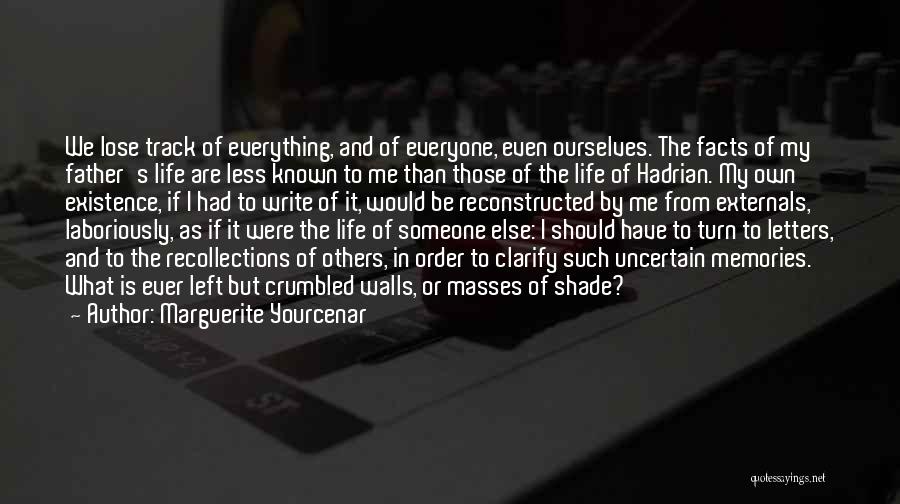
We lose track of everything, and of everyone, even ourselves. The facts of my father's life are less known to me than those of the life of Hadrian. My own existence, if I had to write of it, would be reconstructed by me from externals, laboriously, as if it were the life of someone else: I should have to turn to letters, and to the recollections of others, in order to clarify such uncertain memories. What is ever left but crumbled walls, or masses of shade? — Marguerite Yourcenar

Books are not life, only its ashes. — Marguerite Yourcenar
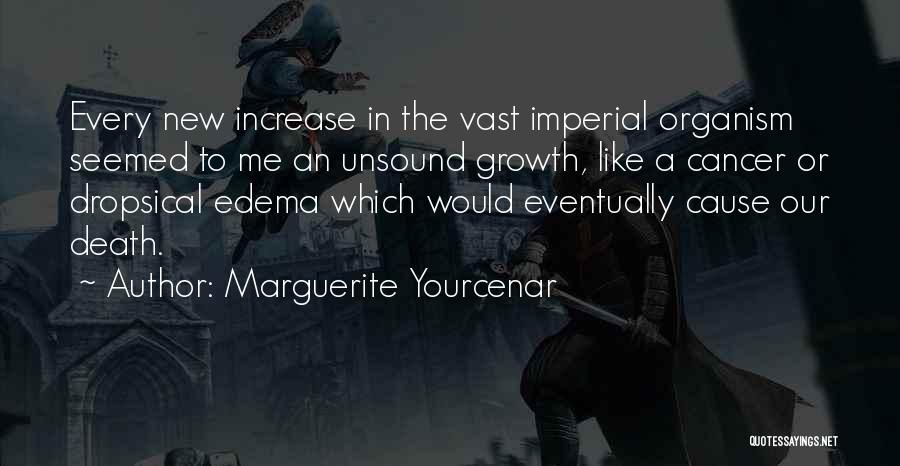
Every new increase in the vast imperial organism seemed to me an unsound growth, like a cancer or dropsical edema which would eventually cause our death. — Marguerite Yourcenar
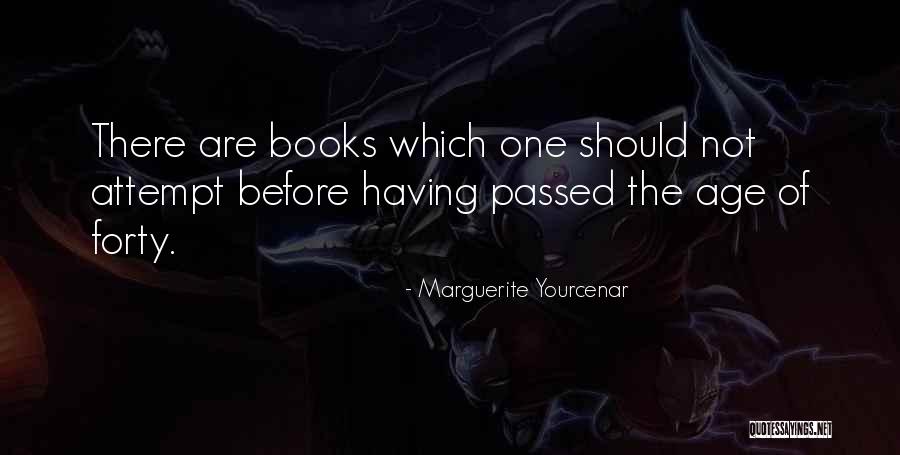
There are books which one should not attempt before having passed the age of forty. — Marguerite Yourcenar
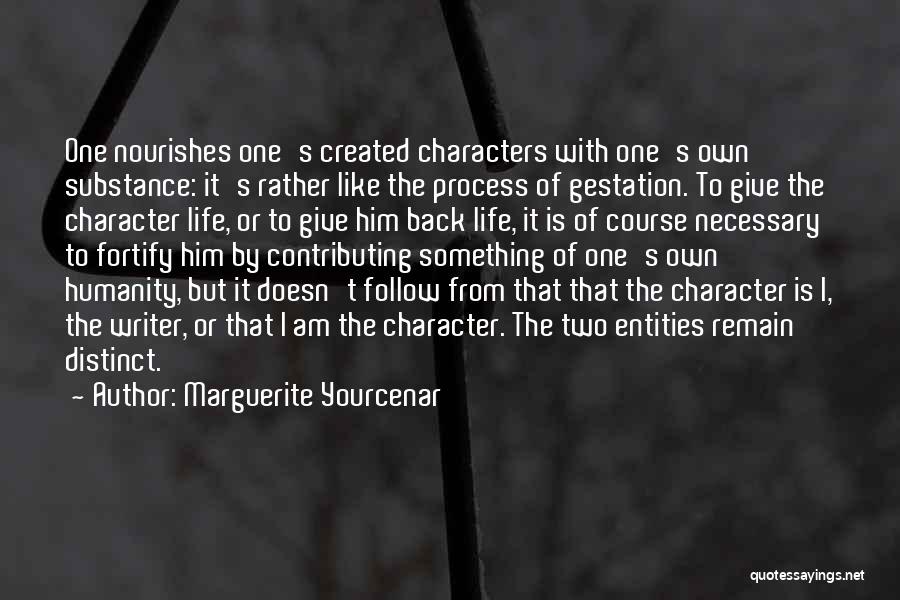
One nourishes one's created characters with one's own substance: it's rather like the process of gestation. To give the character life, or to give him back life, it is of course necessary to fortify him by contributing something of one's own humanity, but it doesn't follow from that that the character is I, the writer, or that I am the character. The two entities remain distinct. — Marguerite Yourcenar

Everything turns out to be valuable that one does for one's self without thought of profit. — Marguerite Yourcenar

I believe that friendship, like love, of which it is a particular kind, requires nearly as much art as a successful choreography. — Marguerite Yourcenar
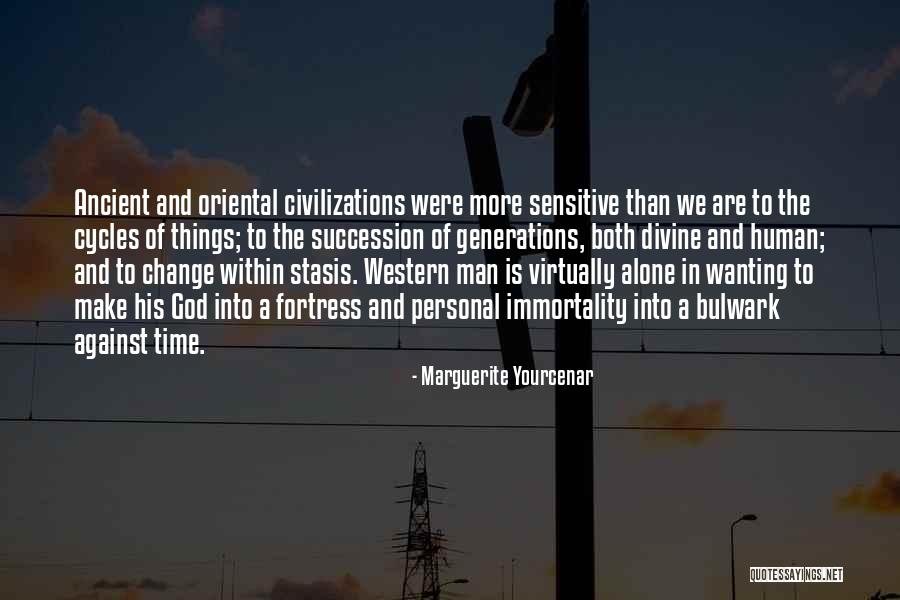
Ancient and oriental civilizations were more sensitive than we are to the cycles of things; to the succession of generations, both divine and human; and to change within stasis. Western man is virtually alone in wanting to make his God into a fortress and personal immortality into a bulwark against time. — Marguerite Yourcenar
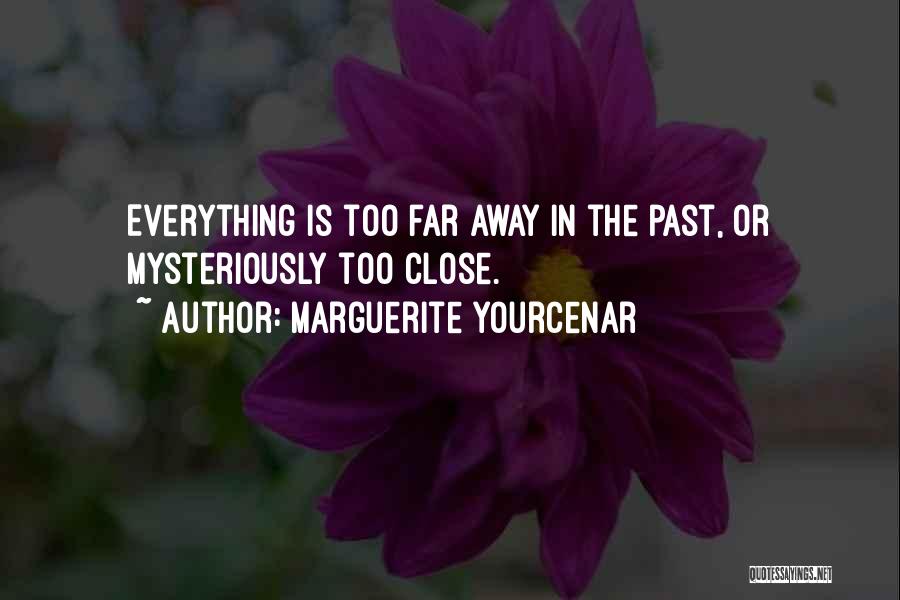
Everything is too far away in the past, or mysteriously too close. — Marguerite Yourcenar
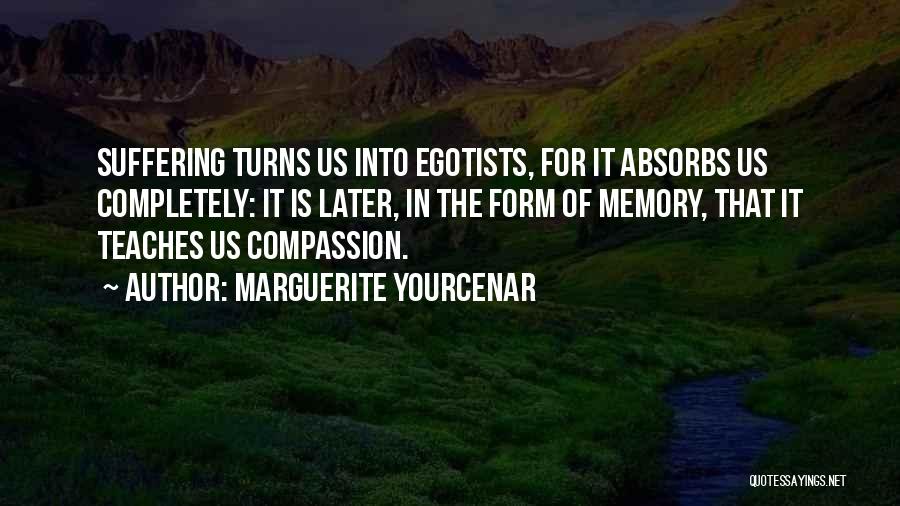
Suffering turns us into egotists, for it absorbs us completely: it is later, in the form of memory, that it teaches us compassion. — Marguerite Yourcenar

the lover who leaves reason in control does not follow his god to the end. — Marguerite Yourcenar
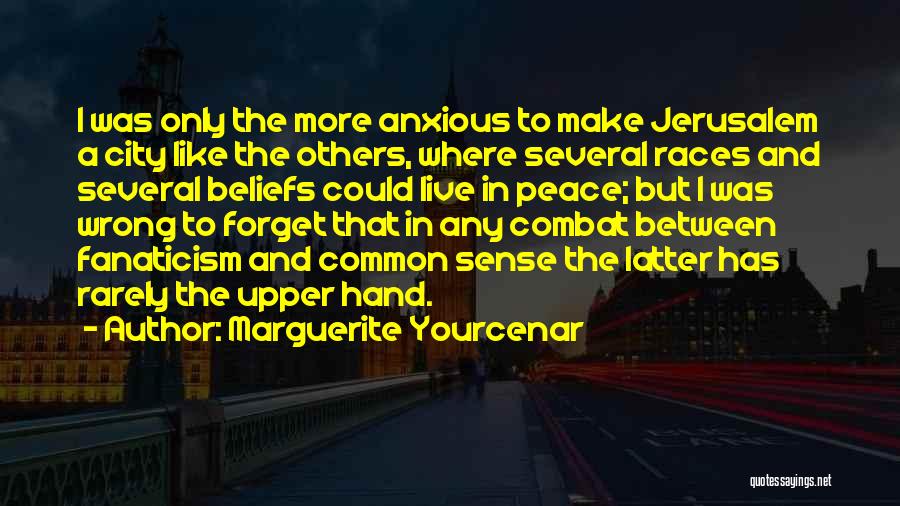
I was only the more anxious to make Jerusalem a city like the others, where several races and several beliefs could live in peace; but I was wrong to forget that in any combat between fanaticism and common sense the latter has rarely the upper hand. — Marguerite Yourcenar
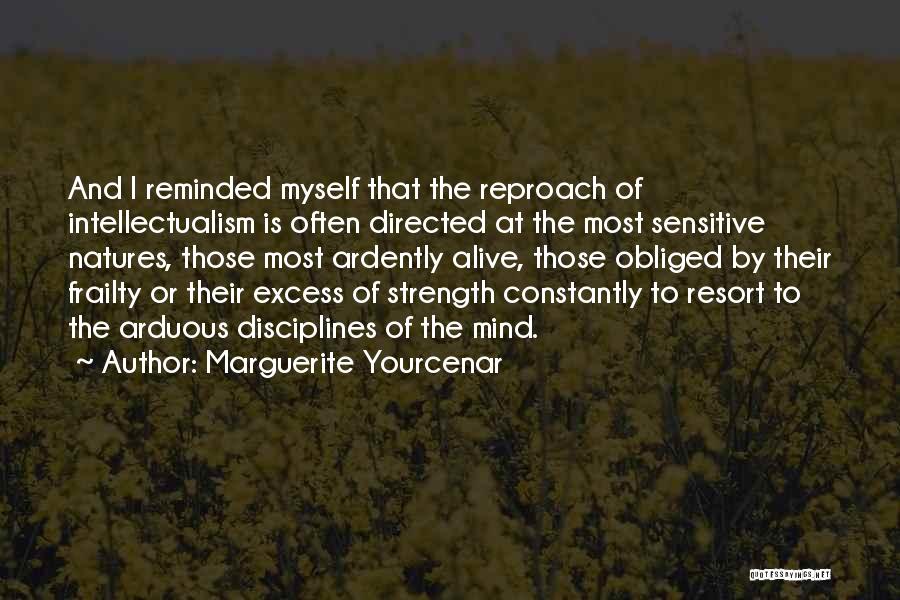
And I reminded myself that the reproach of intellectualism is often directed at the most sensitive natures, those most ardently alive, those obliged by their frailty or their excess of strength constantly to resort to the arduous disciplines of the mind. — Marguerite Yourcenar

Our great mistake is to try to exact from each person virtues which he does not possess, and to neglect the cultivation of those which he has. — Marguerite Yourcenar
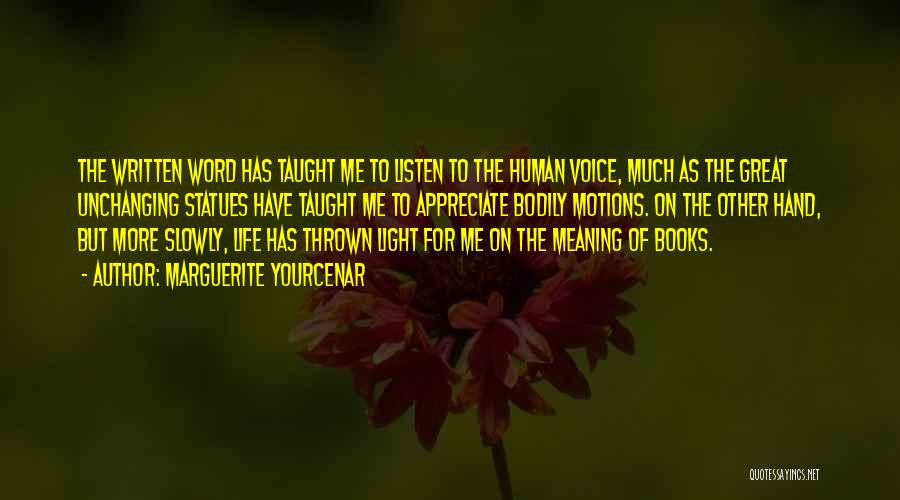
The written word has taught me to listen to the human voice, much as the great unchanging statues have taught me to appreciate bodily motions. On the other hand, but more slowly, life has thrown light for me on the meaning of books. — Marguerite Yourcenar
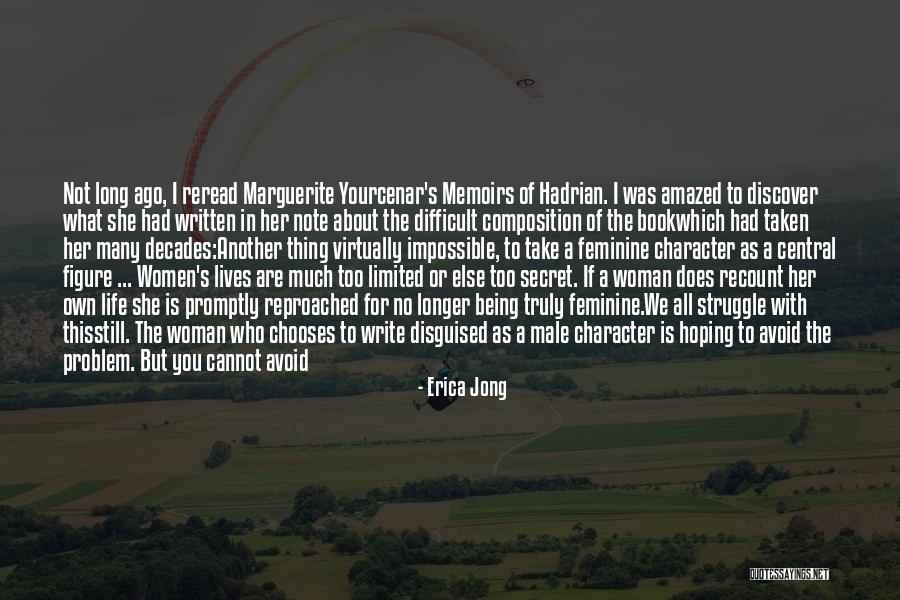
Not long ago, I reread Marguerite Yourcenar's Memoirs of Hadrian. I was amazed to discover what she had written in her note about the difficult composition of the book
which had taken her many decades:
Another thing virtually impossible, to take a feminine character as a central figure ... Women's lives are much too limited or else too secret. If a woman does recount her own life she is promptly reproached for no longer being truly feminine.
We all struggle with this
still. The woman who chooses to write disguised as a male character is hoping to avoid the problem. But you cannot avoid the problem of being a woman. — Erica Jong

I have come to think that great men are characterized precisely by the extreme position which they take, and that their heroism consists in holding to that extremity throughout their lives. — Marguerite Yourcenar
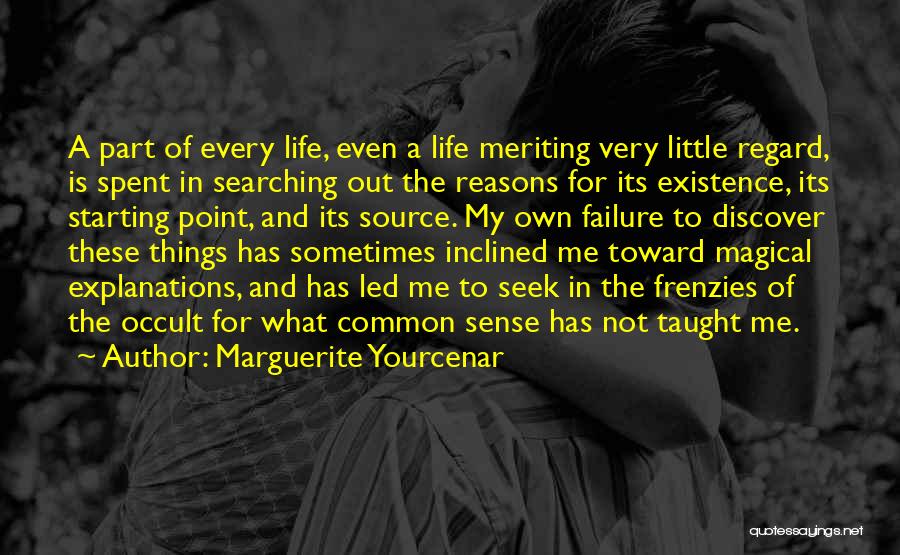
A part of every life, even a life meriting very little regard, is spent in searching out the reasons for its existence, its starting point, and its source. My own failure to discover these things has sometimes inclined me toward magical explanations, and has led me to seek in the frenzies of the occult for what common sense has not taught me. — Marguerite Yourcenar





